The Topton N305 NAS Motherboard+CPU Combo – Should You Buy It?
If you have come to this article on the Topton N305 NAS Motherboard, then chances are you are a very specific kind of NAS user! When you want to build your own NAS from scratch, there is always the balance between POWER and POWER EFFICIENCY! The former, means you can get so much more done, as quickly as possible – the latter is a pursuit to ensure that this 24×7 DiY NAS server is not going to cost you a small fortune in electricity costs! Until recently, the 2020/2021 released Topton N5105/N6005 NAS+Mobo combo was considered the best balance in the market to provide a fair balance of performance, capability and power efficiency. However, because Intel has moved forward with its refresh of their processors into the newer generation (largely killing off the Intel Celeron and Pentium naming) AND brands such as Topton have now vastly improved their development techniques, many MANY eyes have now moved over to the newer Topton Intel N305 and N100 NAS Motherboard. Most ‘Build Your Own’ (BYO) NAS buyers are considering this highly praised little M-ITX combo for their new Plex Build, their new modest Container/VM server with Proxmox, or scaling up from a private cloud to a 5-6 drive UnRAID or TrueNAS server! But, is the N305 NAS motherboard actually any good? What are the main differences to consider between the N305 and N100 model? And is it reliable enough for your data? In this article we dig into the hardware and share what we find!
Note – You can watch the Topton N305 full hardware review and dive HERE on YouTube
Additionally, find our lists of the recommended NAS CPU+Mobo Combos HERE on NASCompares in a dedicated article
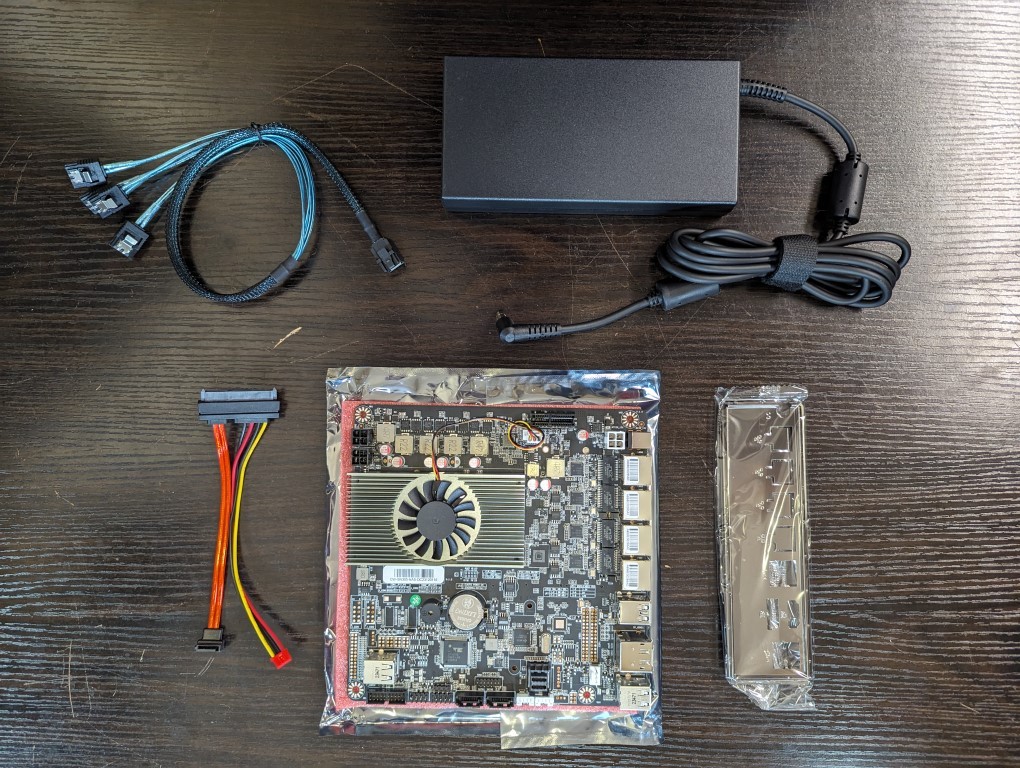 |
|
|---|---|
| Where to Buy
(Amazon / Aliexpress) |
ALIEXPRESS $279 HERE (Upgrades Available)
Amazon $348 HERE (Board Only) |
| Component | Specification |
| Processor | Intel Alder Lake-N i3-N305 |
| Memory | 1x SO-DIMM DDR5 4800MHz, up to 16/32GB |
| Storage | 2x M.2 NVMe 3×1 Slot, 2x SATA3 |
| PCIe Slot | PCIe 3×1 (cut) |
| Graphics | Intel UHD Graphics |
| Display Outputs | 2x HDMI, 1x DP, 1x Type-C (all 4096 x 2160@60Hz) |
| Network Card | 4x Intel i226-V 2.5G |
| 4G LTE/SIM | Yes |
| Wireless? | MICROPCIe Slot (Shared with PCIe 3×1 Slot) |
| USB Ports | 5x USB2.0, 1x USB3 via FPanel and Pins |
| Cooling | Passive cooling with fanless heatsink |
| BIOS | AMI EFI BIOS with various supports |
| TDP | 9-15W |
| Power Input | DC 12V (External PSU option) |
| Case Material | Aluminium Alloy |
| Expansion | PWM fan power connector, TPM Pin |
| Dimensions | 158.0mm x 126.5mm x 60.2mm |
| Color | Black or Gray (random) |
| Installation | Desktop, Wall-mounted |
| Operating Environment | 0°C to 70°C, 5%-85% Humidity |
Topton N305 DiY NAS CPU+MoBo Combo – Hardware Design
The Topton N305 Board is offered on Aliexpress with various pricing options based on the included components. The basic package, which includes just the CPU and motherboard, is priced at $319. For an additional $10, customers can obtain the package with a SAS fan-out cable for enhanced storage capabilities, totalling $329. The most comprehensive option includes everything mentioned plus an external PSU, available for $359. This tiered pricing structure provides flexibility for buyers based on their specific needs and desired configurations.
The latest version of the Topton N305 ITX motherboard now includes a metal, high quality fan-assisted heatsink. This new feature aims to enhance cooling efficiency for the system. It’s a significant update for those looking for improved thermal management in their ITX setups.
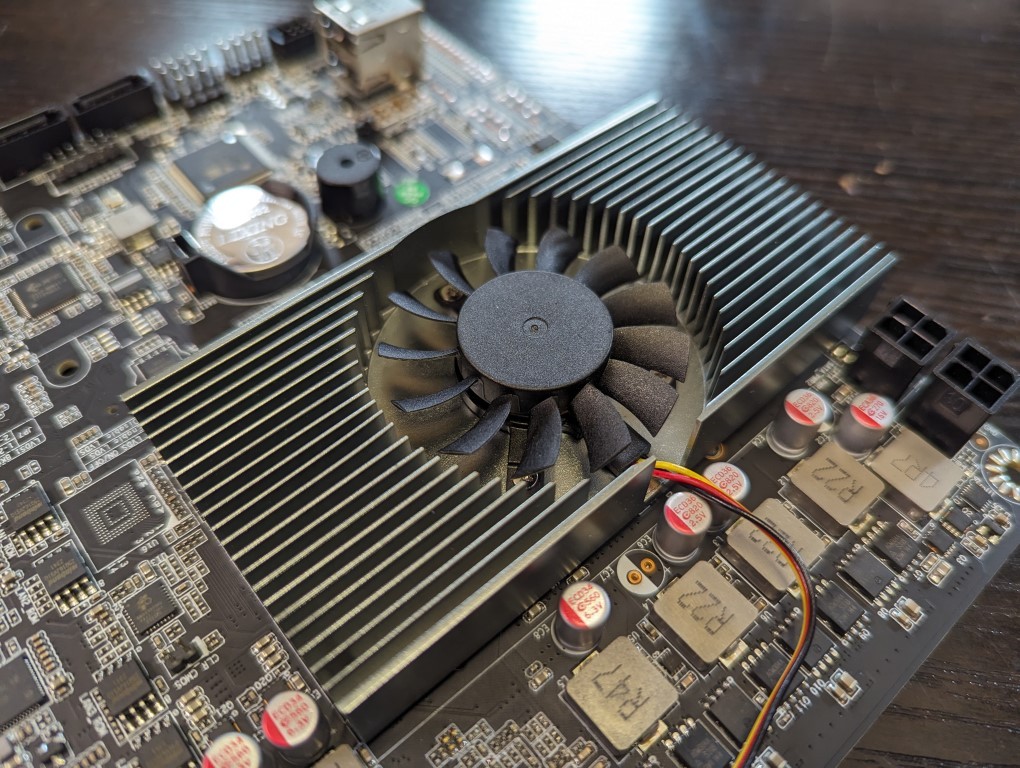
The N305 CPU, a central component of Topton’s latest NAS and DiY switch motherboard, showcases Intel’s innovative engineering through its Alder Lake-N architecture, catering specifically to efficiency and performance. With its Intel 7 lithography, the processor strikes a balance between power consumption and computational prowess, offering a TDP of 9-15W. This optimization allows for reduced energy usage while maintaining high performance, making it an ideal choice for NAS systems where efficiency is paramount.
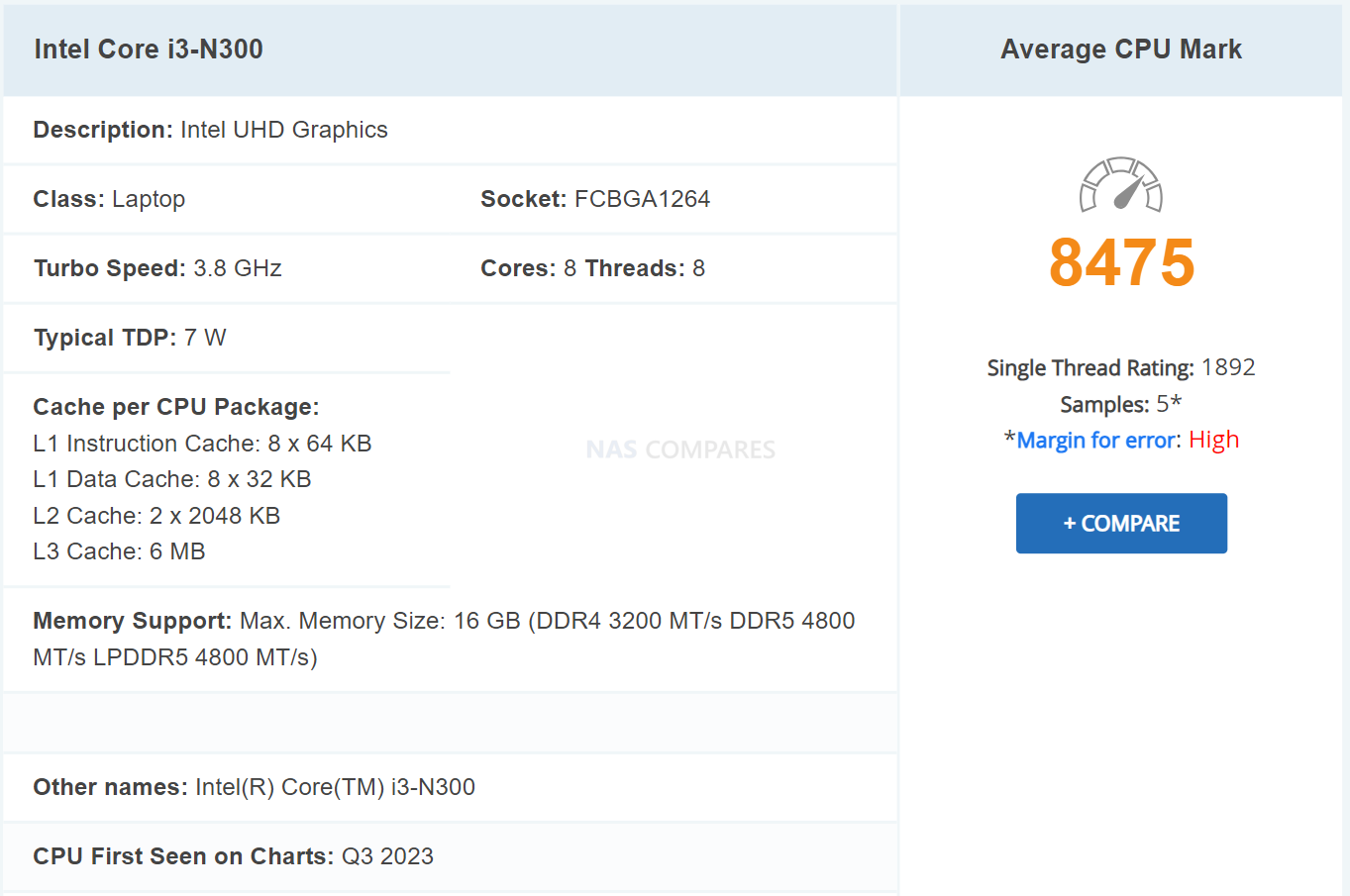
Embedded within the motherboard, the N305 CPU supports advanced memory capabilities, including DDR5, ensuring broad compatibility and future-proofing for evolving storage technologies. The processor’s ability to handle up to 16GB of memory alongside its versatile support for various memory speeds up to 4800 MHz underlines its capacity to manage intensive data transactions and storage operations. This flexibility is crucial for NAS applications, which demand rapid access to and processing of voluminous data sets.
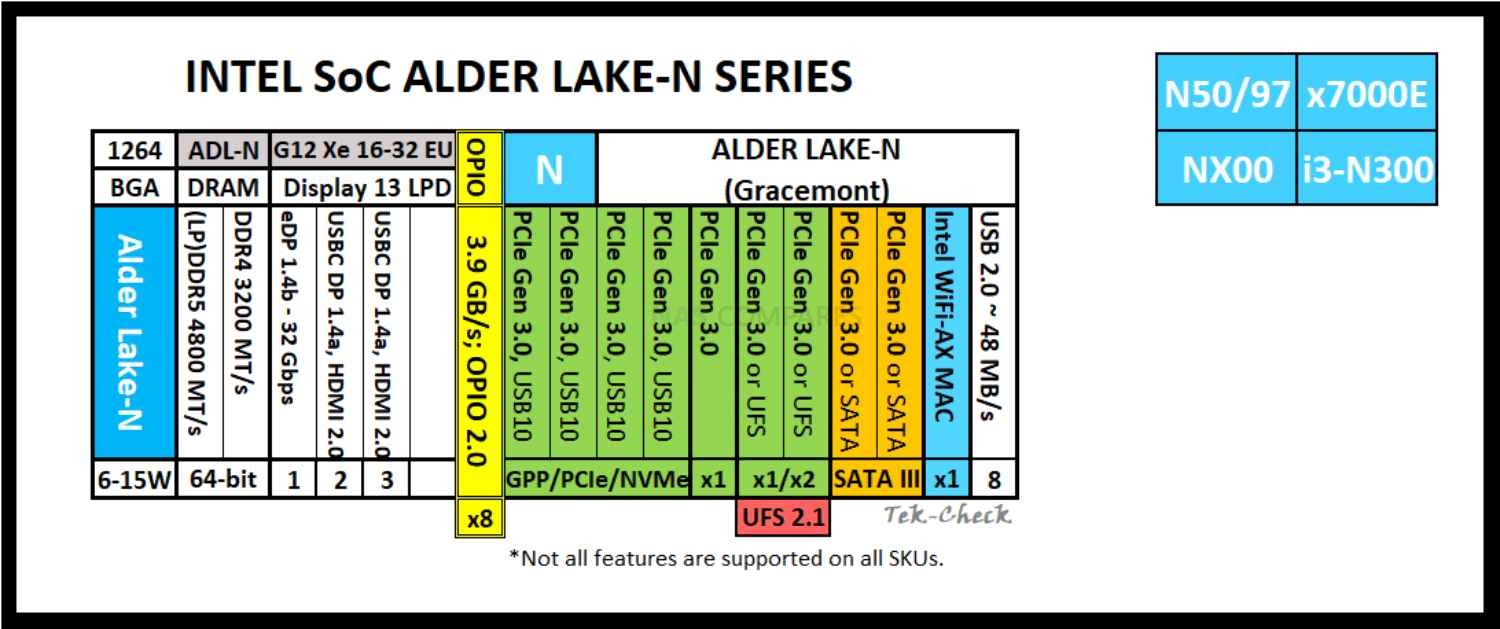
Furthermore, the integration of Intel UHD Graphics within the CPU provides substantial support for multimedia tasks, extending the motherboard’s utility beyond mere storage. This feature, coupled with the processor’s support for multiple displays and high-definition outputs, enables the N305 NAS Motherboard to serve as a central hub for not only storage but also media streaming and light graphical tasks. The inclusion of advanced technologies like Intel Quick Sync Video highlights the CPU’s adeptness at encoding and decoding video streams efficiently, thereby enhancing the functionality of NAS systems built with the N305 motherboard for a variety of applications.
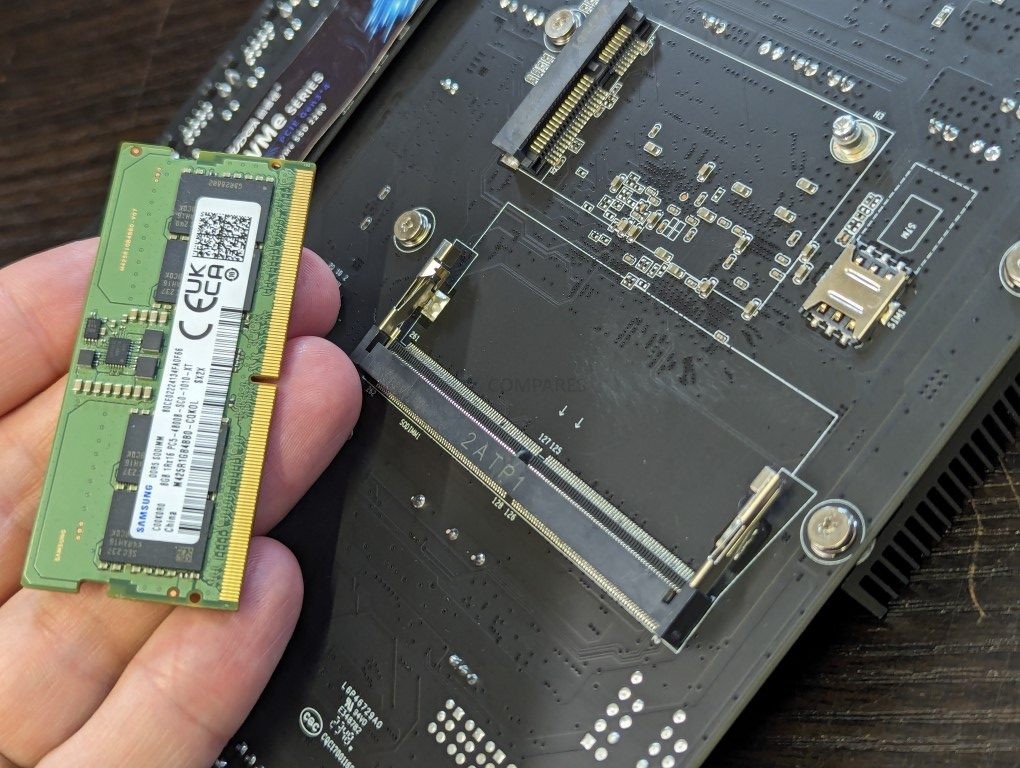
The Topton N305 NAS Motherboard incorporates a single SO-DIMM slot for memory, strategically located on the motherboard’s rear, optimizing space and accessibility. This design choice underscores the board’s compact and efficient layout, catering to users seeking a balance between performance and form factor in their NAS solutions. However, it’s important to note that this system does not support ECC (Error-Correcting Code) memory. The absence of ECC support is typical for systems prioritizing cost-effectiveness and simplicity over the error correction capabilities critical in enterprise-level servers. Despite this, the motherboard’s memory compatibility, supporting up to 32GB of DDR5 RAM at speeds of 4800MHz (and compatibility with 5200/5600MHz), ensures robust performance for various NAS applications.
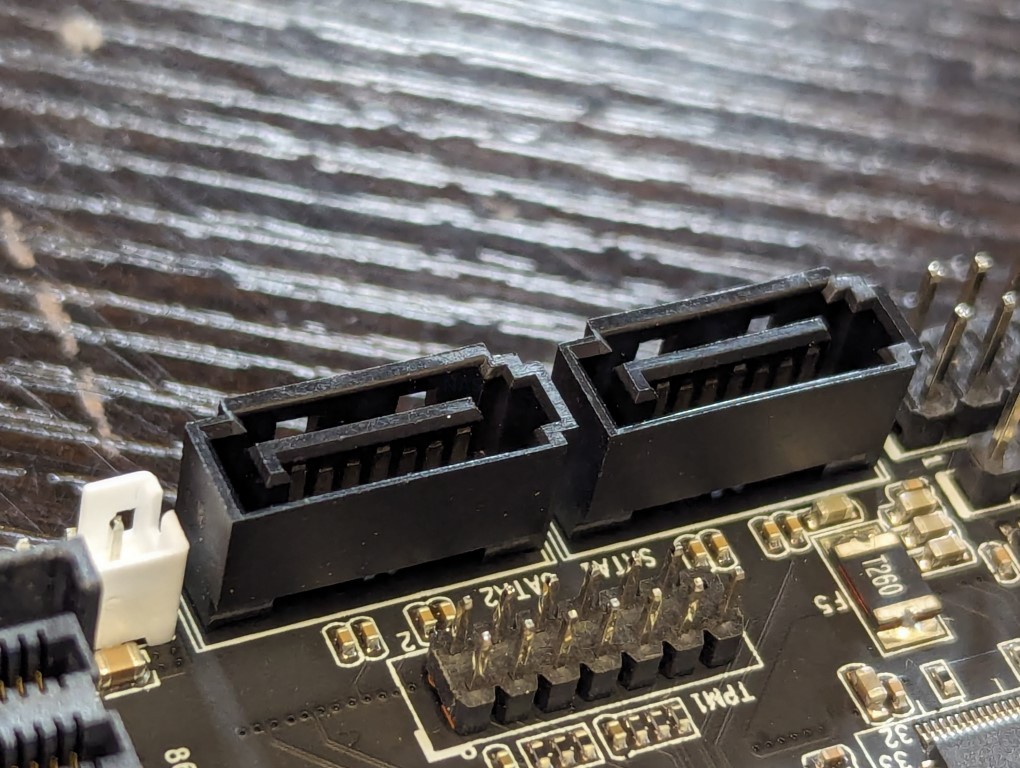
At the top section of the Mini-ITX NAS motherboard, there are two distinct SATA connection ports available for direct drive connections. Additionally, it features an SFF-8643 output. This output enables the connection of four more SATA drives. The connectivity expansion is facilitated through a compatible cable.
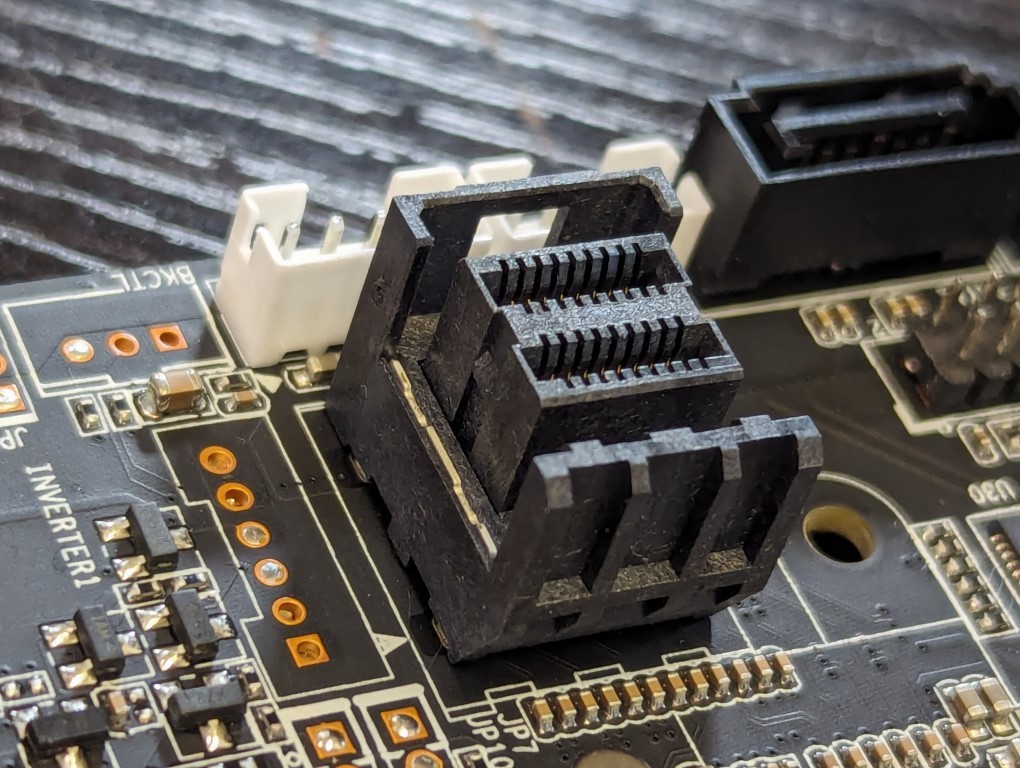
The motherboard utilizes a JMB585 controller for enhanced SATA drive management, bridging the gap between PCIe hosts and SATA/AHCI storage devices. This integration allows the board to support five SATA ports through the JMB585, enhancing its storage capabilities.
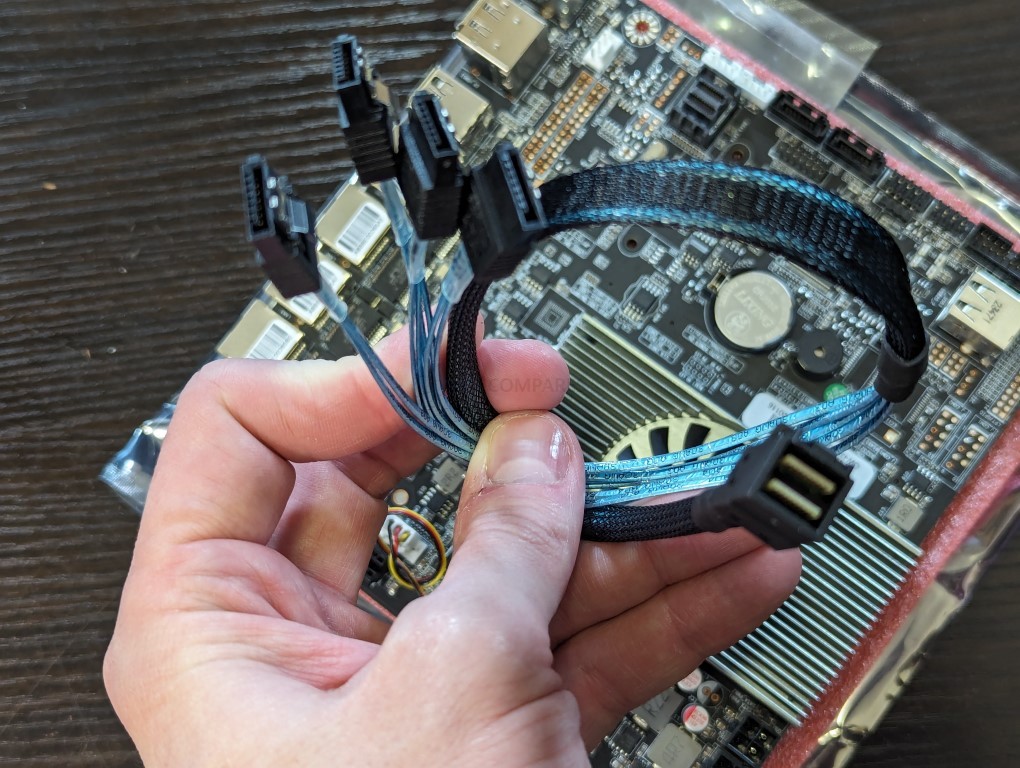
The controller also enables Port Multiplier support, significantly expanding potential storage configurations. This setup is particularly beneficial for users looking to maximize their storage options, offering a versatile solution for a variety of storage needs.
Example:
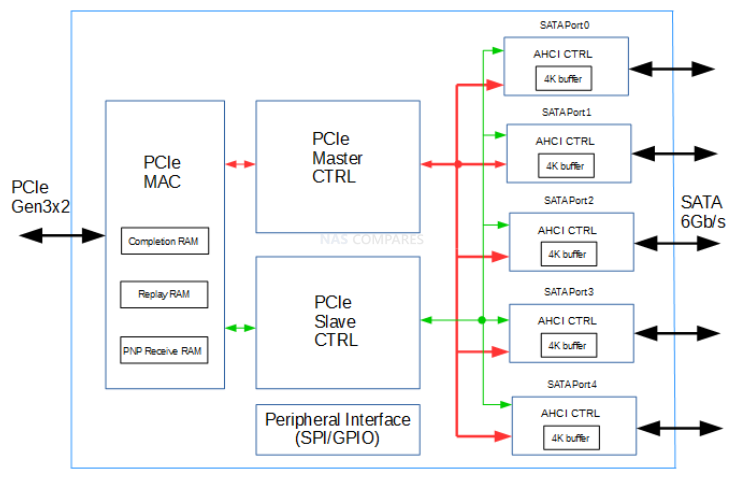
It supports command-based switching (CBS) and FIS (Frame Information Structure)-based switching (FBS). JMB585 also support TRIM to the SSD and can transmit and receive data by both of AHCI mode and legacy IDE mode to and from the host respectively.
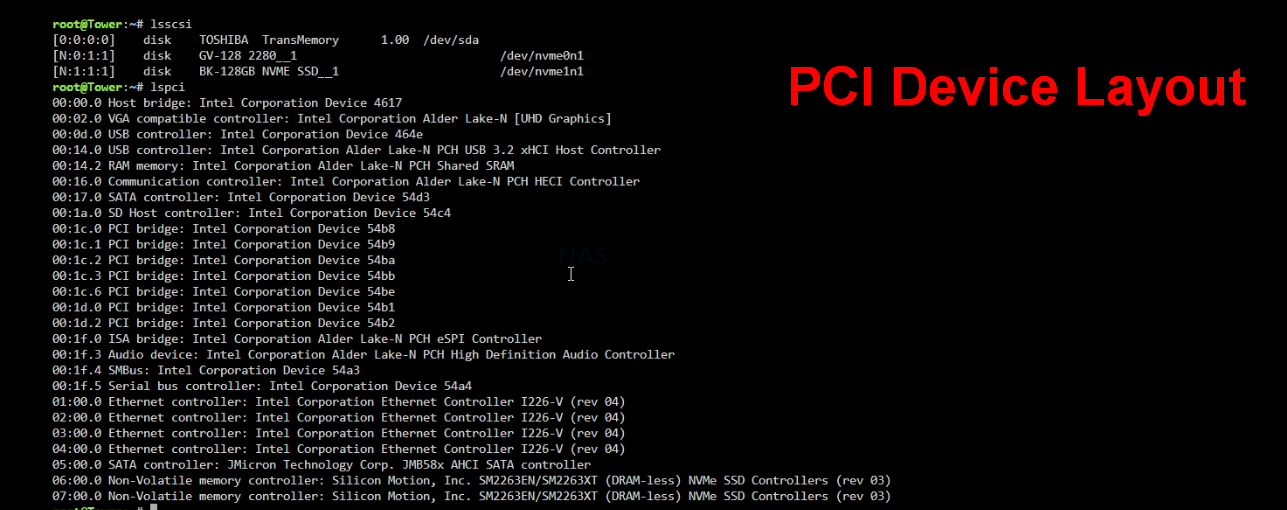
Although this review is of the DC output version of the Topton N305 NAS board, there is also two 4-POWER (12V) connectors at the rear corner of the motherboard to supply additional power for bulk storage needs as required in some enclosures and backplanes.
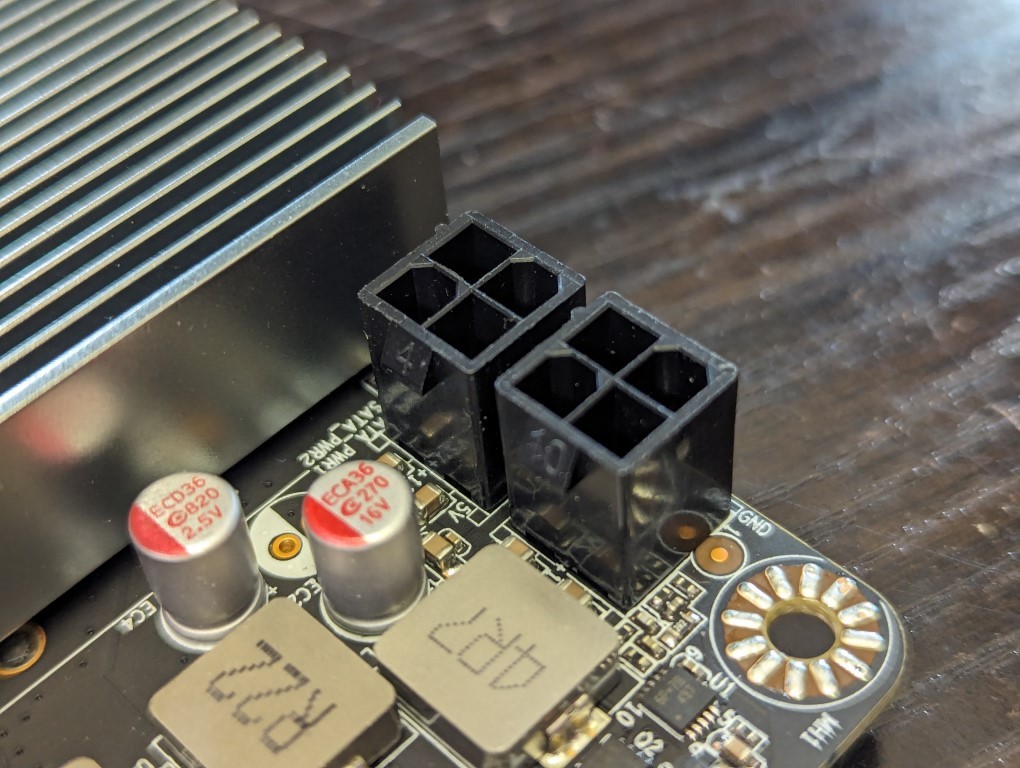
This review focuses on the DC output variant of the Topton N305 NAS motherboard. Additionally, it features two 4-POWER (12V) connectors located at the rear corner. These connectors are designed to supply extra power for extensive storage needs. This capability is especially useful in certain enclosures and backplanes where additional power is necessary for bulk storage management.
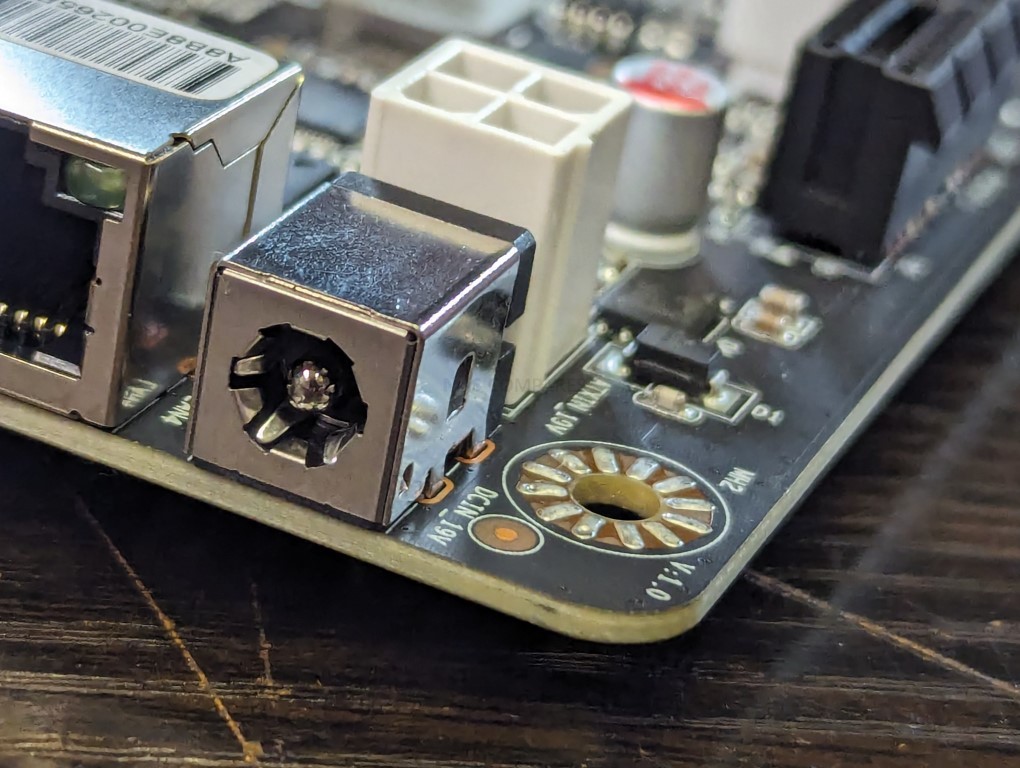
The Topton N305 DC motherboard is supplied with an external power supply unit (PSU), specifically a 180W model produced by Chicony, a name that may not be familiar to all. No, me neither…
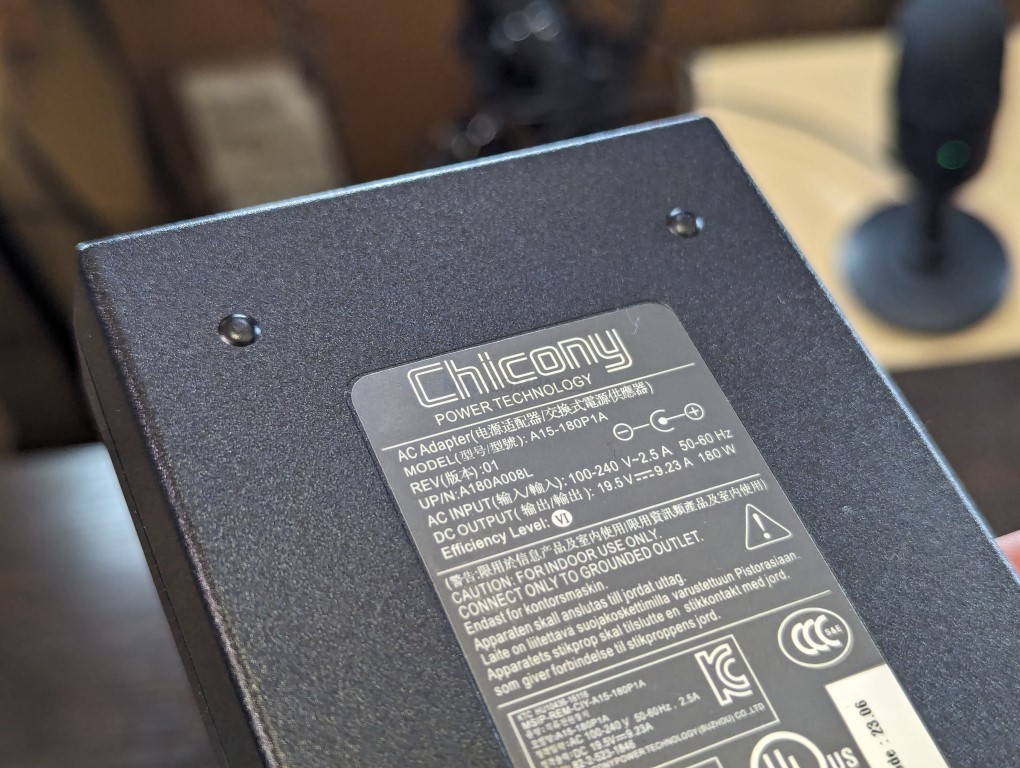
The fan-assisted CPU cooling system on the Topton N305 NAS motherboard receives commendation for its efficiency, producing minimal noise while maintaining a surprisingly low profile. This design choice enhances the overall user experience by ensuring effective thermal management without adding bulk or disruptive sound to the setup.
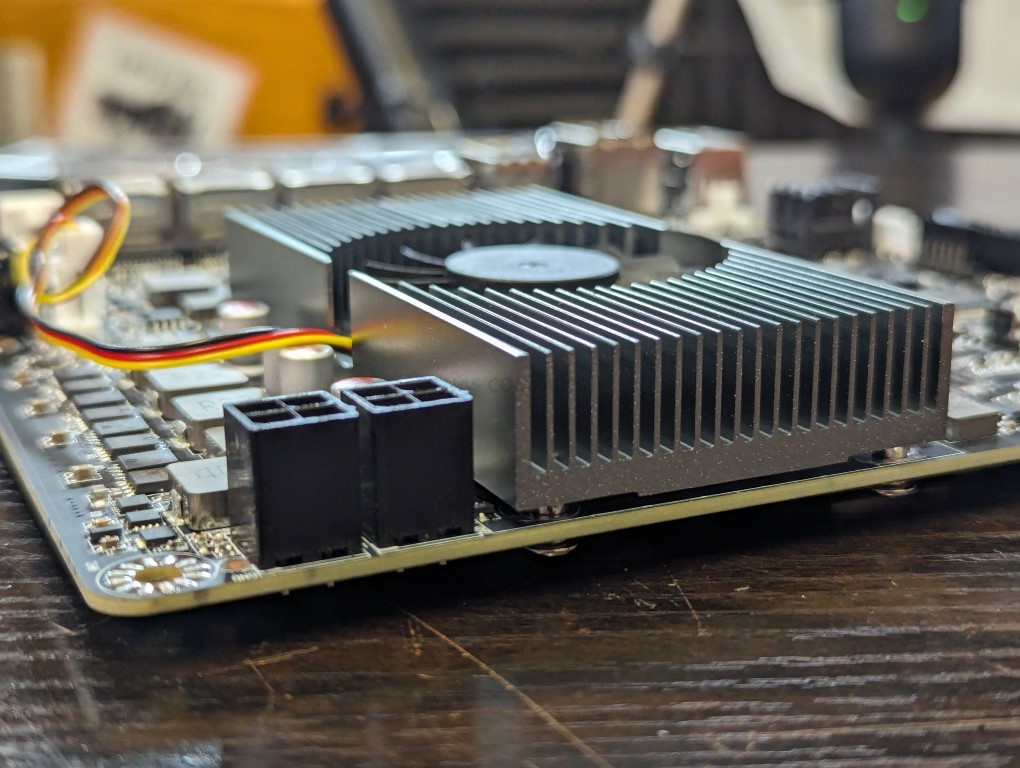
The N305 NAS motherboard facilitates M.2 NVMe storage through two 2280 slots. These slots are strategically located on the rear or base of the motherboard for easy access and efficient space utilization. This configuration allows for high-speed storage solutions to be incorporated seamlessly into the system, enhancing its performance capabilities.
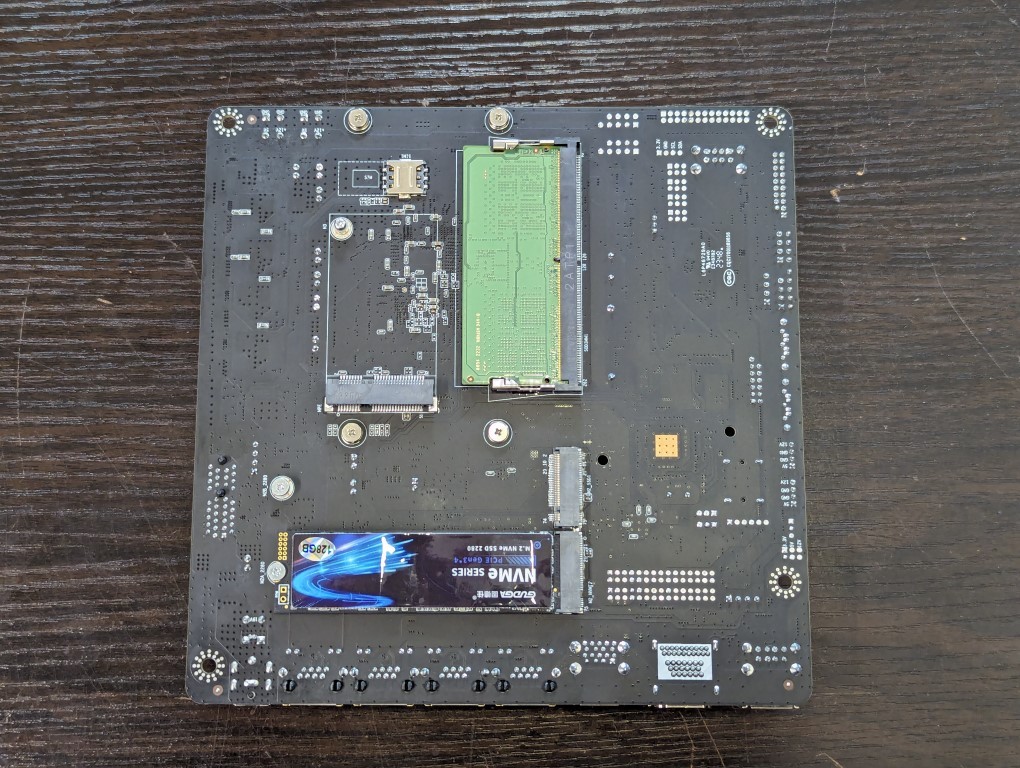
The M.2 connectors on the N305 NAS motherboard are specified as PCIe Gen 3×1, providing a maximum bandwidth of 1000MB/s for each slot. While it may be seen as a drawback that 3×4 NVMe drives will operate in these 3×1 slots, limiting their maximum speed, this configuration remains noteworthy. Considering the motherboard’s compact scale and the overall allocation of 9 PCIe lanes, the inclusion of these connectors and their performance capability is still an impressive feat, balancing system expansion with available resources.
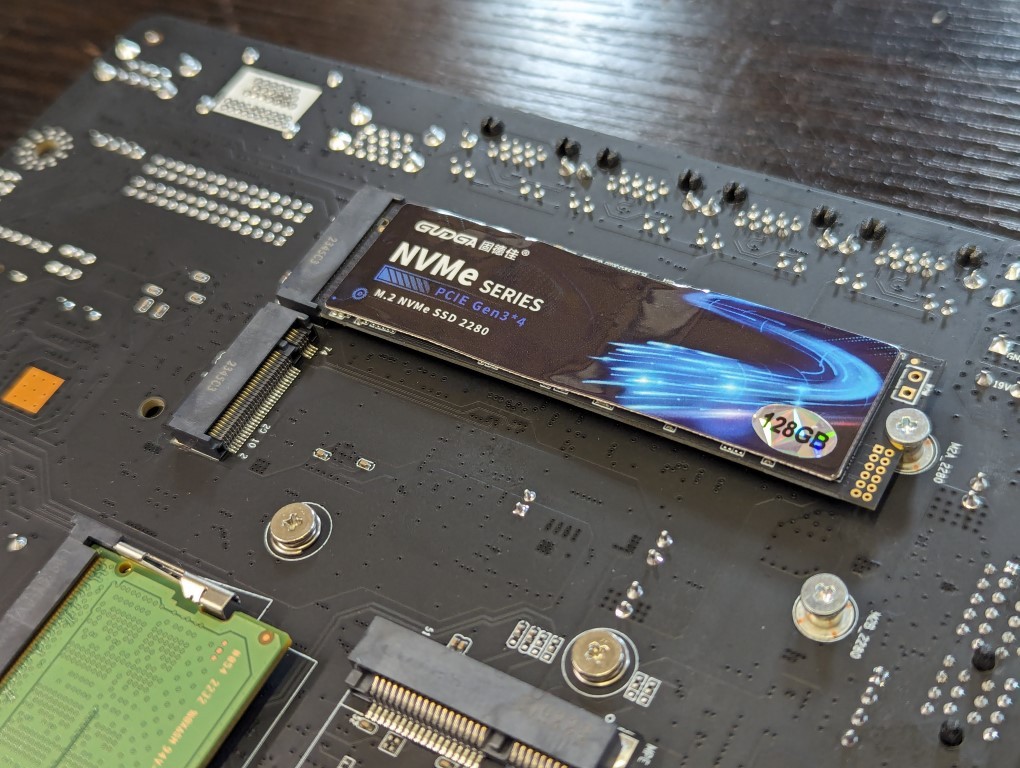
Our examination through SSH terminal within UnRAID has verified the configuration of the slots. It’s confirmed that they operate at the downgraded bandwidth of 3×1. This adjustment aligns with the system’s specifications and ensures compatibility within its infrastructure.
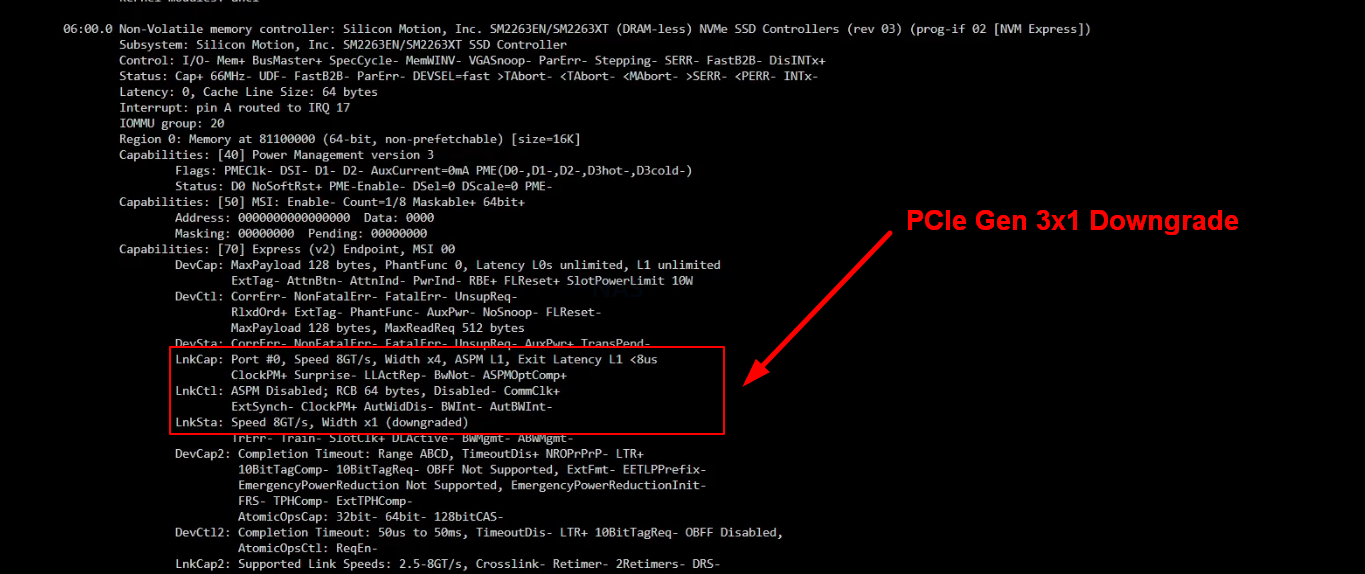
During our disk speed tests on the motherboard, a standard PCIe 3×4 NVMe drive was tested using a 1GB file. The results showed a sequential read/write speed of approximately 750-780MB/s. This performance is indicative of the operational bandwidth limits imposed by the 3×1 slot configuration on the motherboard.
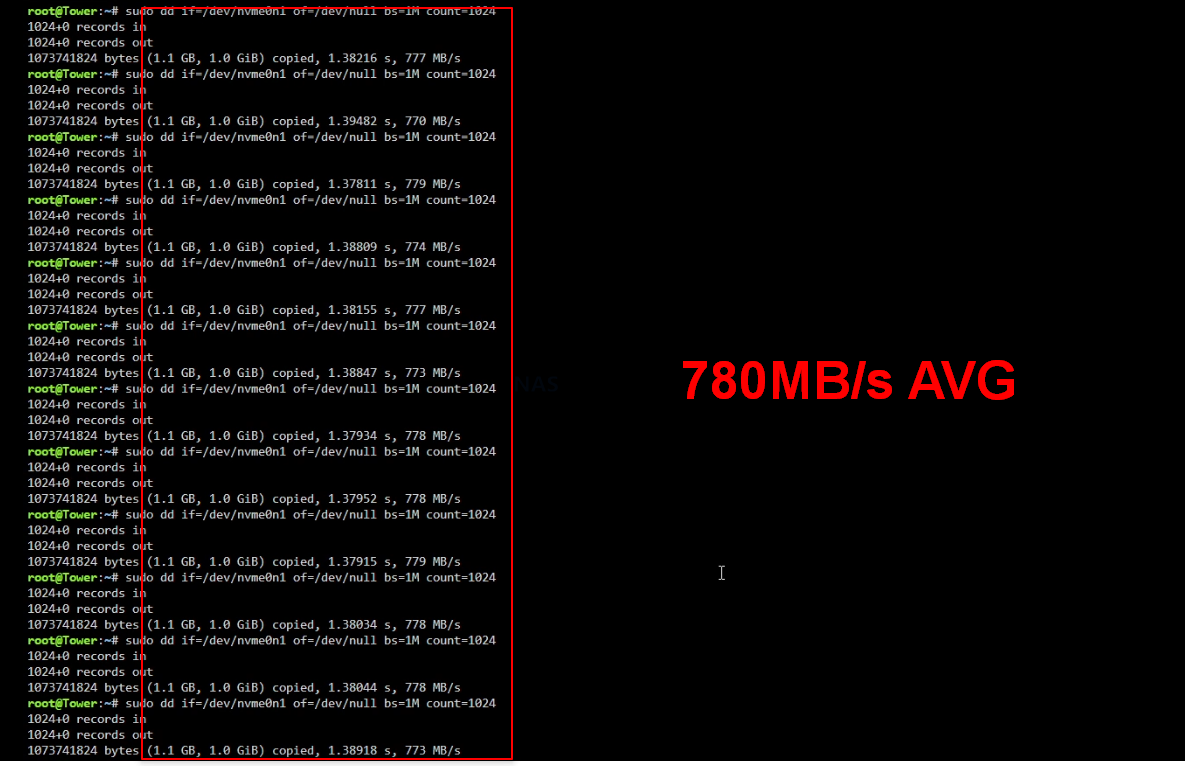
In our tests transferring data between two M.2 NVMe drives with a 1GB file, the speeds achieved ranged from 320-330MB/s. This suggests that the two NVMe slots share a single lane or path on the motherboard. The shared pathway is likely the reason for these specific transfer speeds, indicating a bottleneck at the shared connection point.
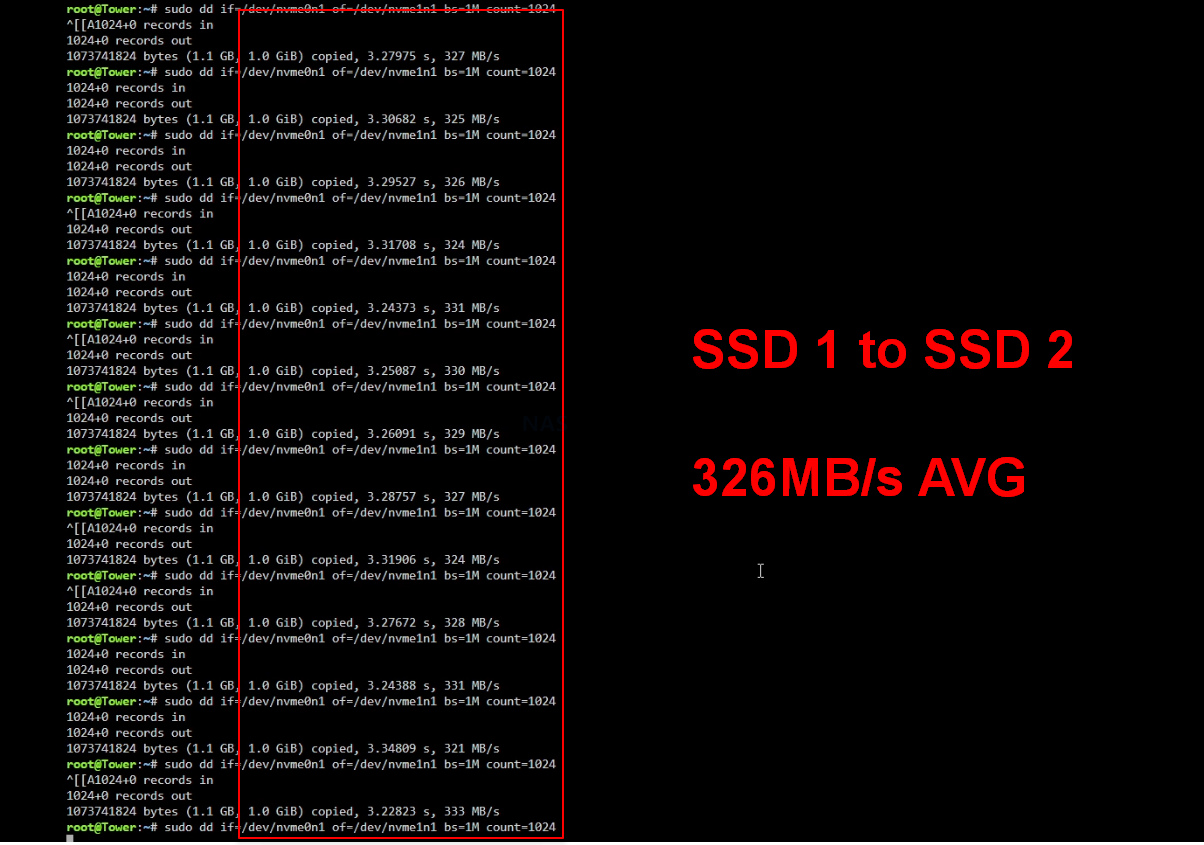
Located at the front-bottom of the motherboard is a PCIe slot, specifically designed for further system enhancements and expansions. This slot opens up opportunities for additional upgrades, allowing users to customize their setups according to their specific needs. It represents a key feature for those looking to extend the motherboard’s capabilities beyond its initial configuration.
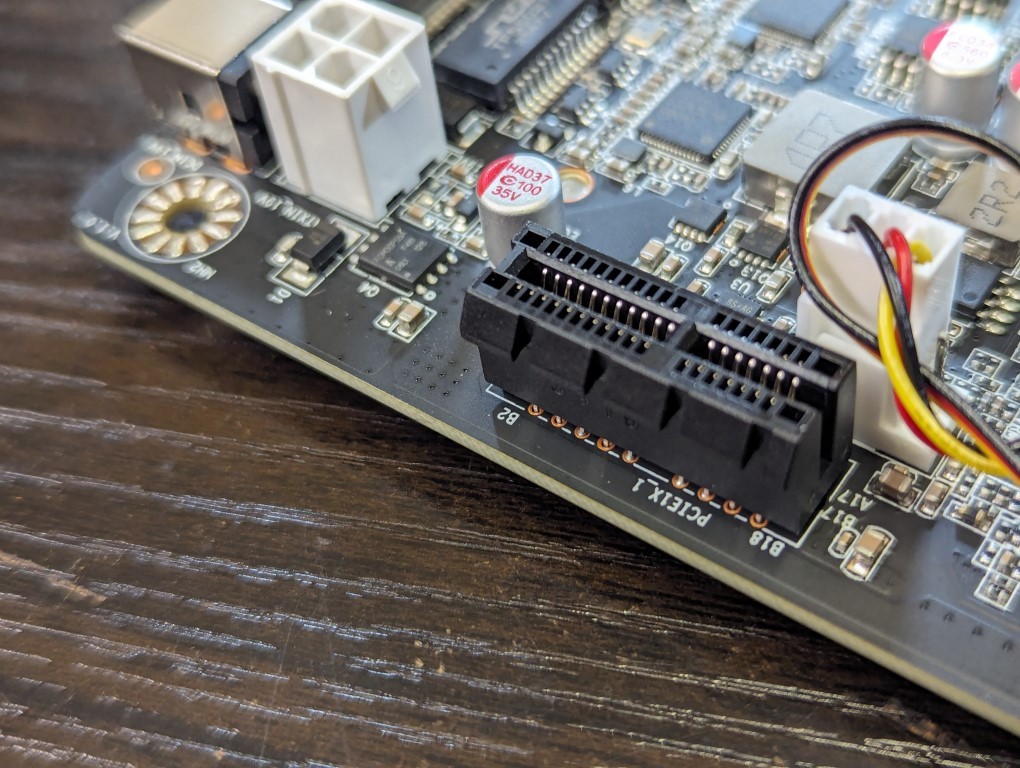
The PCIe slot on the motherboard operates with Gen 3×1 specifications, offering a maximum bandwidth of 1,000MB/s. Despite this limitation, it has been physically designed to accommodate longer cards, such as x4, x8, or x16. This thoughtful design ensures compatibility with a wider range of expansion cards, providing users with greater flexibility in upgrading their systems. It is something of a compromise between bandwidth capability and physical compatibility, enhancing the motherboard’s adaptability for various use cases. The limitations in PCIe speed and lane allocation on the motherboard stem from the CPU’s architecture, which provides 8-9 lanes. This constraint not only affects the N305 model but also has implications for the N100 version of the motherboard and CPU NAS combo. The lane count directly influences the number and types of devices that can be supported concurrently, impacting overall system expandability and performance. This highlights the importance of the CPU’s lane capacity in determining the motherboard’s capability for expansions and upgrades.
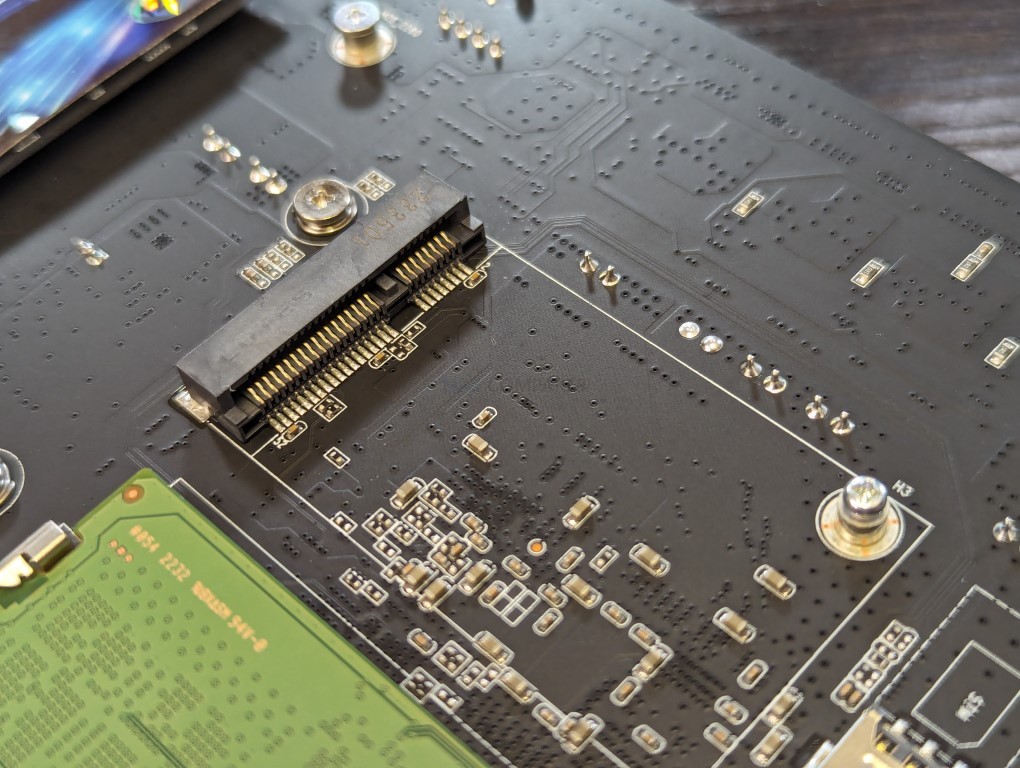
Located on the back of the motherboard is a MINIPCIe slot, primarily intended for adding a wireless network card. This slot, while versatile, is not suitable for a wide range of other expansions. Its inclusion provides an option for wireless connectivity, enhancing the board’s functionality without significantly diversifying its expansion capabilities. The MINIPCIe slot located at the rear of the motherboard is shared with the main PCIe 3×1 slot, meaning they cannot be used simultaneously. This configuration limits the ability to expand the system’s connectivity and upgrade capabilities at the same time. Users must choose between utilizing the MINIPCIe slot for wireless networking or the PCIe slot for other expansions, highlighting a trade-off in the motherboard’s design for flexibility versus functionality.
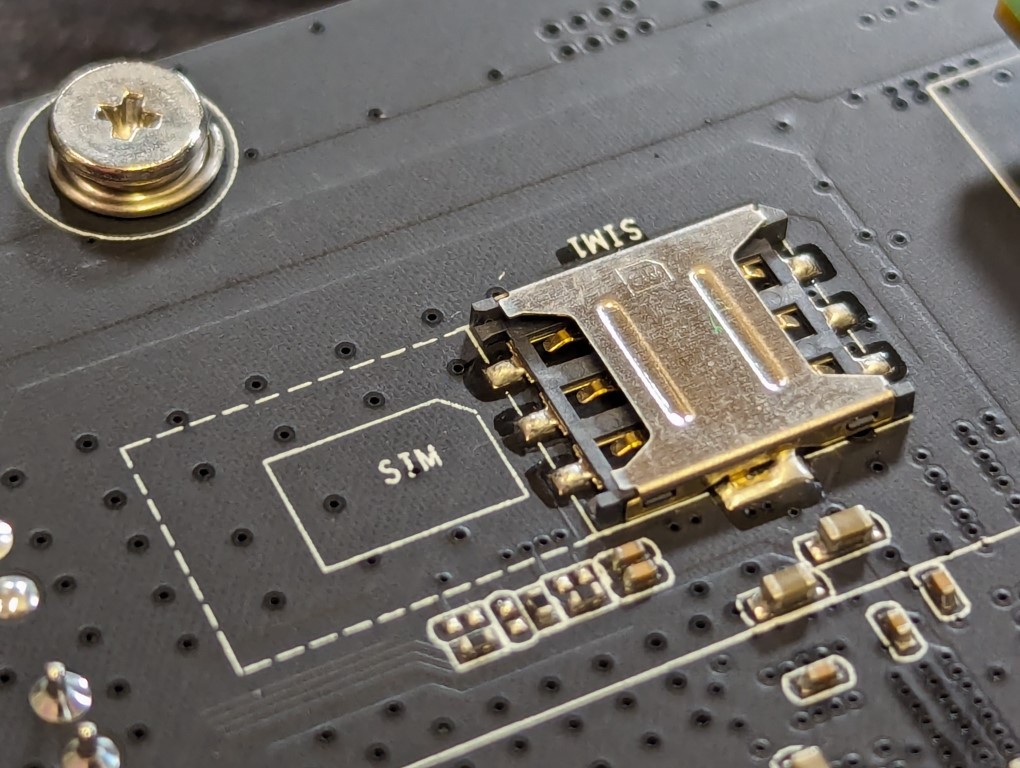
In an interesting move, likely catering to prosumer uses like pfsense and OpenWRT builds, the motherboard includes a 4G LTE/SIM card slot. This addition is somewhat unexpected but expands the board’s utility by enabling direct cellular network access. It suggests a broader vision for the motherboard’s applications, potentially appealing to users requiring remote or backup internet connectivity. Integrating the 4G LTE/SIM card slot for cellular network access into NAS systems like UnRAID may present challenges, as such operating systems might not support this type of cellular network interface. This limitation underscores the importance of verifying compatibility with the intended NAS OS to ensure full functionality of the onboard features. The presence of cellular connectivity options expands the potential use cases for the motherboard, although users must navigate the constraints of OS support.
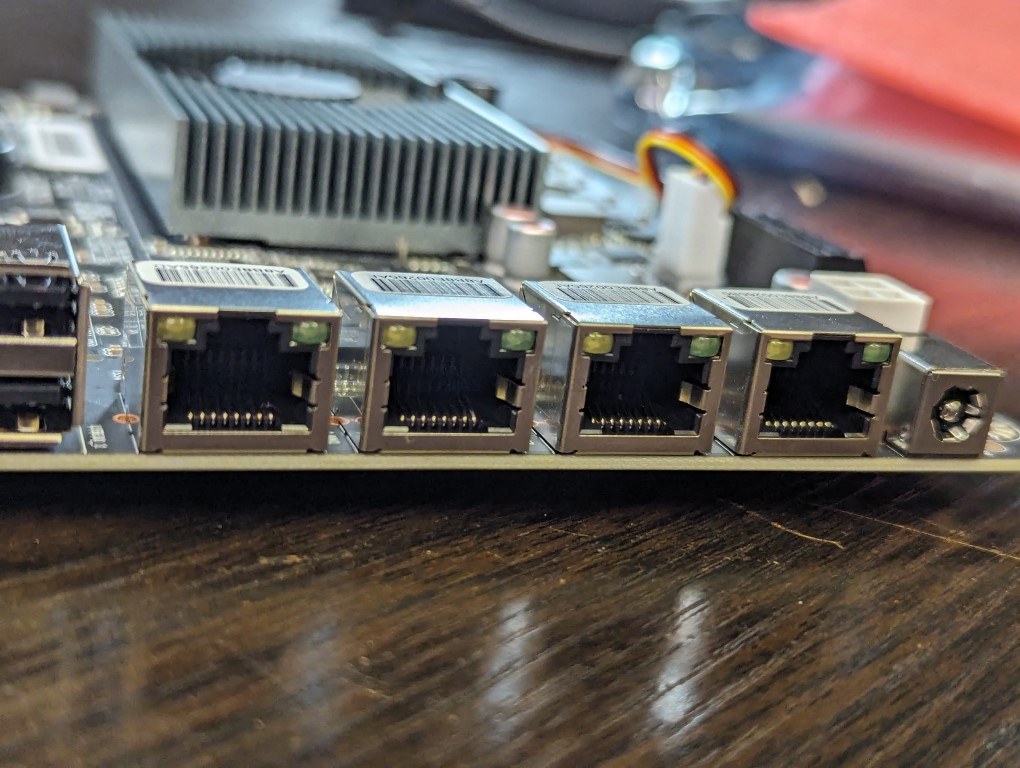
The motherboard is equipped with four 2.5GbE network ports, each powered by an Intel i226-V controller. This setup significantly enhances the board’s networking capabilities, providing robust, high-speed connections suitable for demanding network environments. The inclusion of multiple 2.5GbE ports allows for flexible network configurations and supports advanced networking features, making it an ideal choice for users looking for high-performance networking options in their NAS setups. The integrated network card on the motherboard enables it to achieve a default network bandwidth of over 1GB per second. This high capacity can be distributed across multiple client devices or utilized fully by a single device through advanced networking techniques such as SMB3, load balancing, LAG, or trunking with a compatible smart switch.
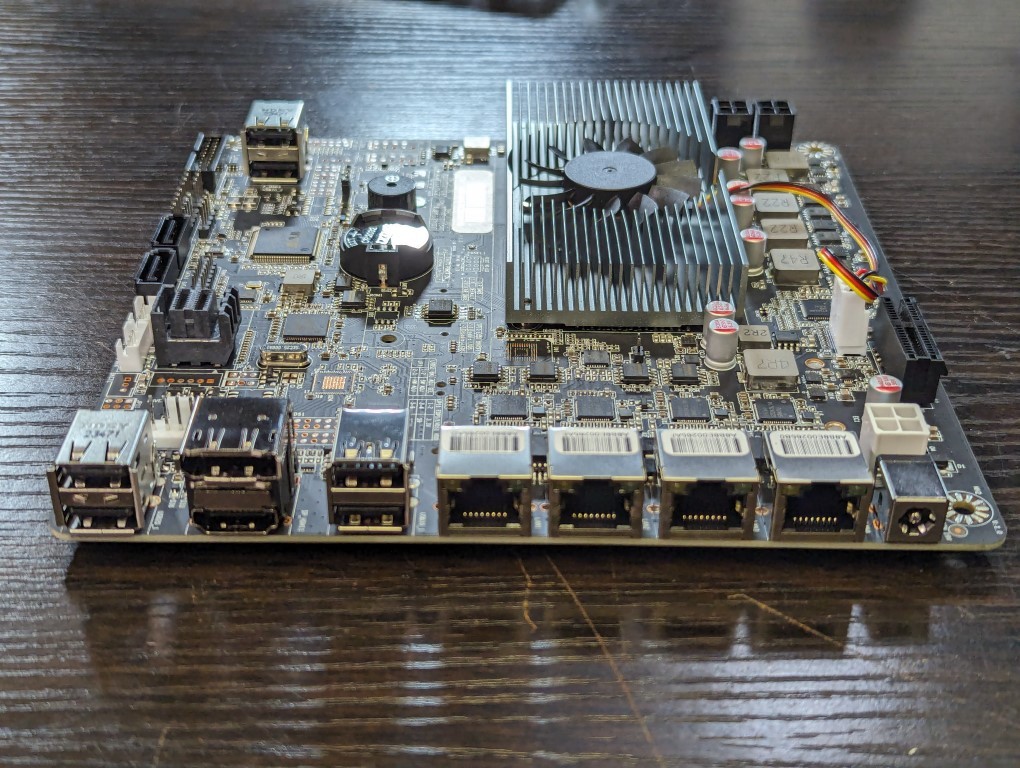
This feature significantly enhances the motherboard’s network performance, catering to both distributed and concentrated network demands. Integrating a 10GbE NIC upgrade into the motherboard’s PCIe 3×1 slot could potentially elevate the network bandwidth to 2GB or 2000MB/s. This enhancement would leverage the available PCIe slot to significantly boost the networking capabilities of the system. Such an upgrade indicates a strong potential for achieving superior network performance, making the system well-suited for high-demand networking tasks. The performance ceiling for the two NVMe drives on the motherboard, even when configured in RAID 0/1, is around 1000MB/s. Meanwhile, connecting 5-6 SATA drives, depending on whether they are HDDs or SATA SSDs, can result in varying performance. With HDDs, expect around 600-800MB/s, and with SATA SSDs, performance can reach up to 1000-1100MB/s. This variation is due to the JMB585 SATA controller operating on a Gen 3 lane, influencing the overall throughput of connected storage devices.
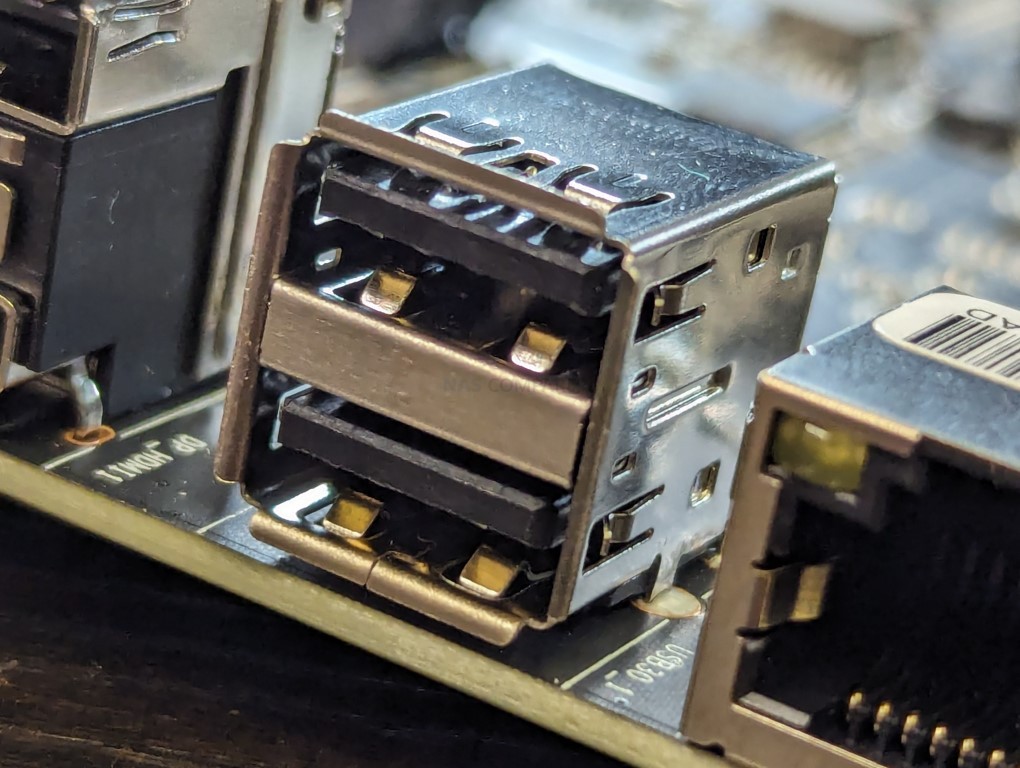
The motherboard is designed with an abundance of USB ports, catering to various connectivity needs. Among these, two ports are uniquely positioned internally, providing a convenient option for connecting an OS boot drive directly on the motherboard. This feature enhances the flexibility and functionality of the system, allowing for streamlined setup and efficient use of space.
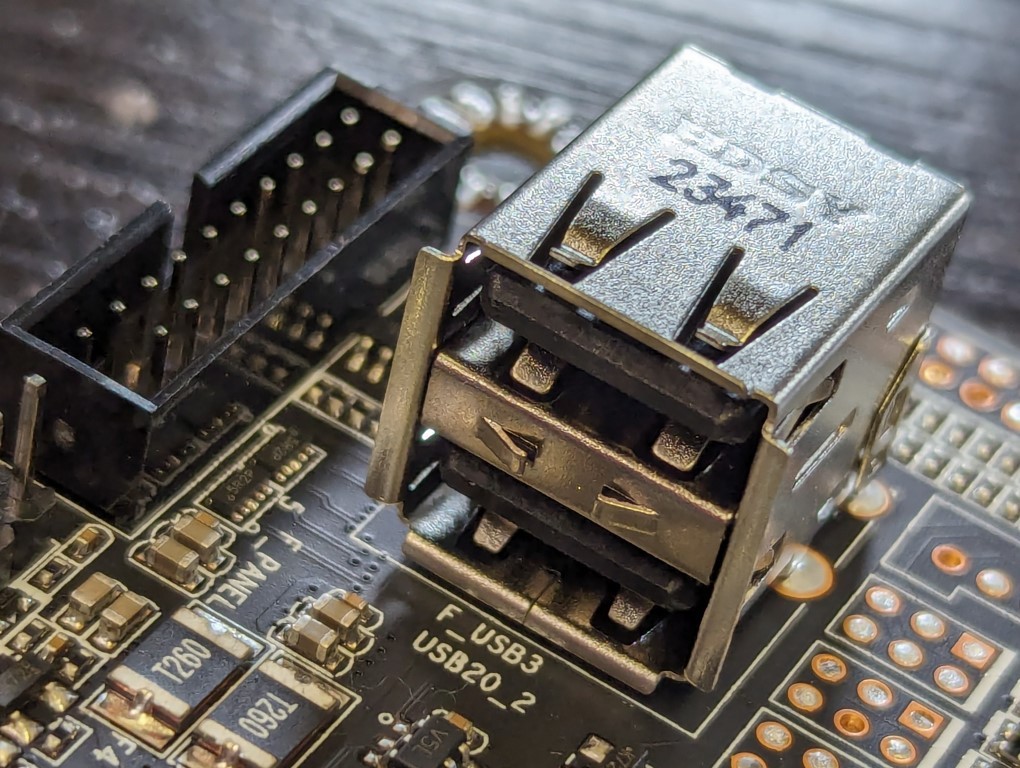
The motherboard features six USB 2.0 ports in total, with four positioned on the rear and two internally on the board, designed for versatile connectivity options, including the possibility of an OS boot drive connection. Additionally, it supports USB 3.2 connectivity through front panel and internal pins, expanding its compatibility with faster USB devices.
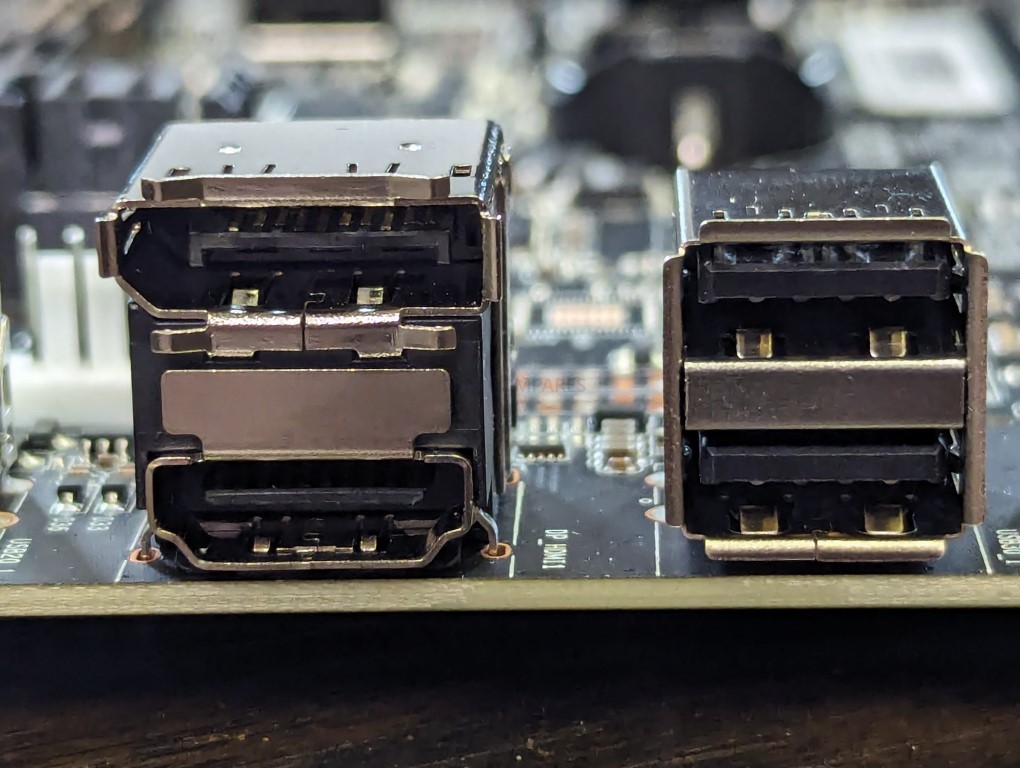
The motherboard is equipped with HDMI 2.0 and DisplayPort 1.4 outputs, supporting 4K resolution at 60FPS. This capability ensures high-quality video output for tasks requiring detailed visuals. Such features make the board suitable for applications beyond traditional computing tasks, including media playback and content creation that demands high-resolution displays.
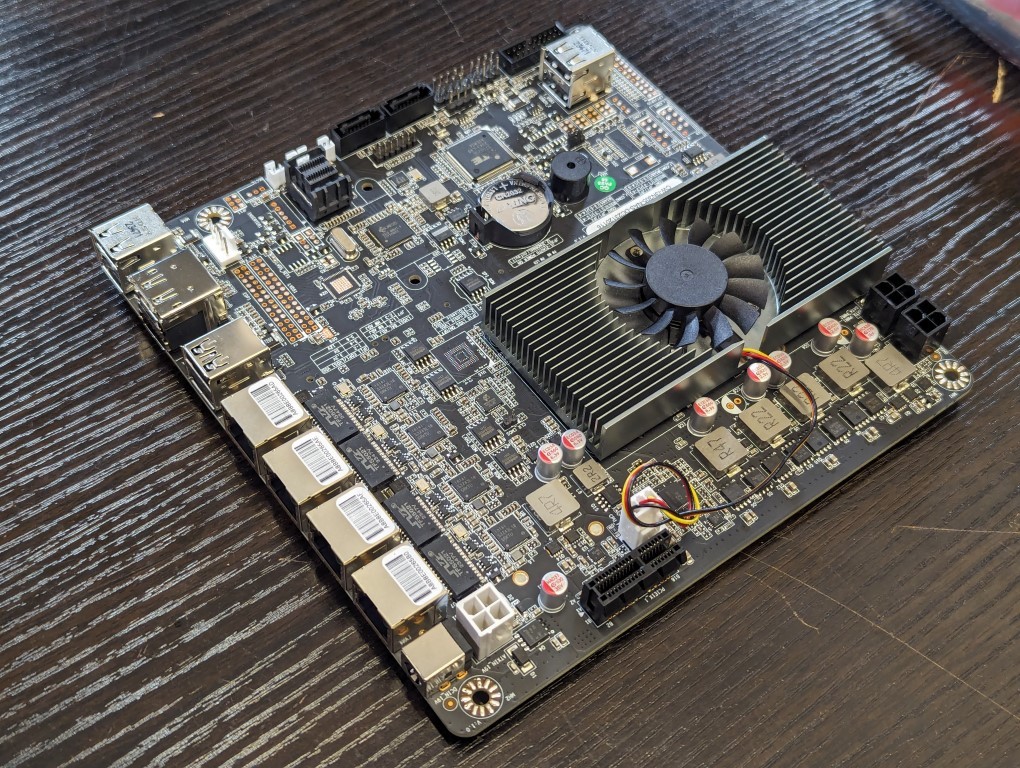
We conducted a video analysis of the Topton N305 NAS Motherboard+CPU combo, exploring its BIOS features and conducting various tests using UnRAID. This in-depth examination aimed to understand the motherboard’s capabilities, performance, and how it handles in different scenarios, particularly focusing on its compatibility and performance with UnRAID as a potential NAS solution. This process provided valuable insights into its suitability for various computing tasks and its overall performance metrics.
The Topton N305 NAS Motherboard+CPU Combo – Should You Buy It?
As of 2024, the Topton N305 NAS motherboard stands out for its balance between power efficiency and functionality, especially at its price range. Its CPU, with a flexible TDP ranging from 9 to 15 watts, impressively manages to offer an 8-core, 8-thread configuration capable of reaching up to 3.8 GHz per core. This makes it an excellent choice for tasks like 4K transcoding on a Plex Media Server, with the potential to handle 8K content thanks to its integrated graphics hitting 1.25 GHz. Despite the limitation of having only 9 PCIe Gen 3 lanes, the design efficiently allocates these resources, supporting up to six SATA drives, two M.2 slots, and a PCIe expansion slot, all on a compact MITX board. While the N100 version presents a more cost-effective and slightly less powerful alternative, the modest increase in power consumption of the N305 variant justifies its higher performance capability, making it a superior choice for those needing a more potent setup. The N305’s design, which mirrors the physical and lane layout of the N100 while significantly enhancing performance, demonstrates an impressive achievement in maximizing the utility and efficiency of a small form factor motherboard.
 |
|
|---|---|
| Where to Buy
(Amazon / Aliexpress) |
ALIEXPRESS $279 HERE (Upgrades Available)
Amazon $348 HERE (Board Only) |
| Component | Specification |
| Processor | Intel Alder Lake-N i3-N305 |
| Memory | 1x SO-DIMM DDR5 4800MHz, up to 16/32GB |
| Storage | 2x M.2 NVMe 3×1 Slot, 2x SATA3 |
| PCIe Slot | PCIe 3×1 (cut) |
| Graphics | Intel UHD Graphics |
| Display Outputs | 2x HDMI, 1x DP, 1x Type-C (all 4096 x 2160@60Hz) |
| Network Card | 4x Intel i226-V 2.5G |
| 4G LTE/SIM | Yes |
| Wireless? | MICROPCIe Slot (Shared with PCIe 3×1 Slot) |
| USB Ports | 5x USB2.0, 1x USB3 via FPanel and Pins |
| Cooling | Passive cooling with fanless heatsink |
| BIOS | AMI EFI BIOS with various supports |
| TDP | 9-15W |
| Power Input | DC 12V (External PSU option) |
| Case Material | Aluminium Alloy |
| Expansion | PWM fan power connector, TPM Pin |
| Dimensions | 158.0mm x 126.5mm x 60.2mm |
| Color | Black or Gray (random) |
| Installation | Desktop, Wall-mounted |
| Operating Environment | 0°C to 70°C, 5%-85% Humidity |
🔒 Join Inner Circle
Get an alert every time something gets added to this specific article!
This description contains links to Amazon. These links will take you to some of the products mentioned in today's content. As an Amazon Associate, I earn from qualifying purchases. Visit the NASCompares Deal Finder to find the best place to buy this device in your region, based on Service, Support and Reputation - Just Search for your NAS Drive in the Box Below
Need Advice on Data Storage from an Expert?
Finally, for free advice about your setup, just leave a message in the comments below here at NASCompares.com and we will get back to you. Need Help?
Where possible (and where appropriate) please provide as much information about your requirements, as then I can arrange the best answer and solution to your needs. Do not worry about your e-mail address being required, it will NOT be used in a mailing list and will NOT be used in any way other than to respond to your enquiry.
Need Help?
Where possible (and where appropriate) please provide as much information about your requirements, as then I can arrange the best answer and solution to your needs. Do not worry about your e-mail address being required, it will NOT be used in a mailing list and will NOT be used in any way other than to respond to your enquiry.

|
 |
ZimaOS is the BEST Beginner NAS OS - Watch Your Back UnRAID and TrueNAS !!!
30TB Hard Drives are TOO BIG ! (and here is why)
COMPLETE UGREEN NAS Setup Guide - 2025 EVERYTHING VERSION
$110 USB4 to 2x10Gb Adapter Review - What the WHAT?
UGREEN NAS Now has iSCSI, 2FA and Jellyfin (and more) - FINALLY!
Seagate 30TB Ironwolf and EXOS Hard Drive Review
Access content via Patreon or KO-FI


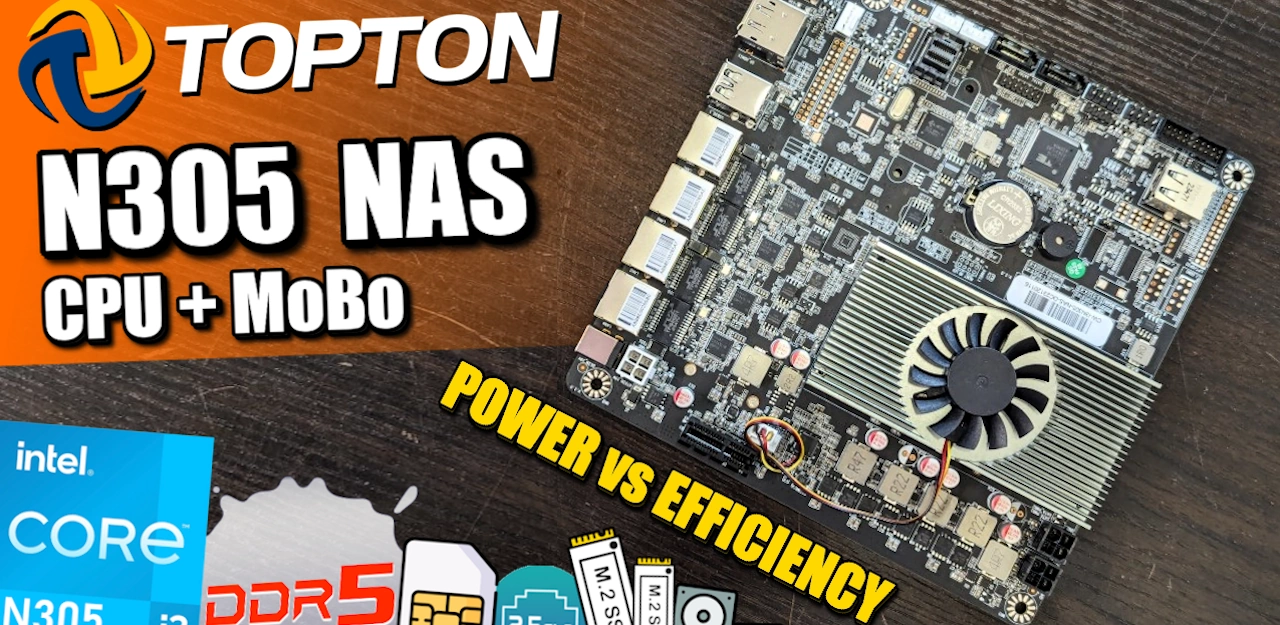
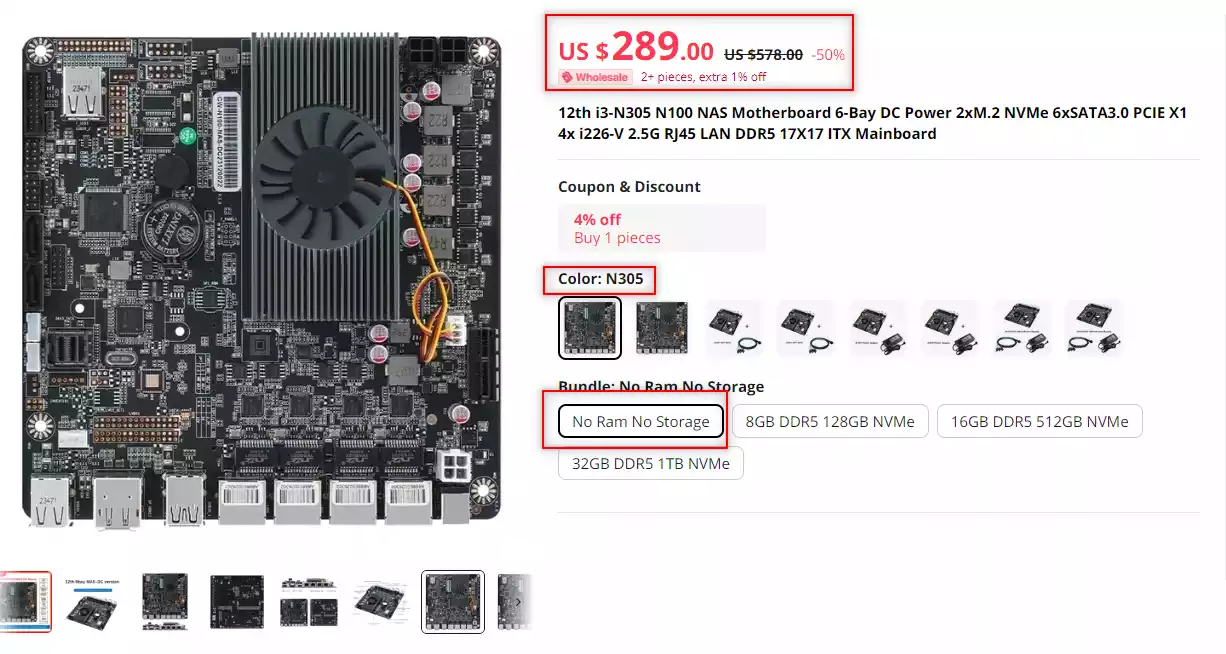
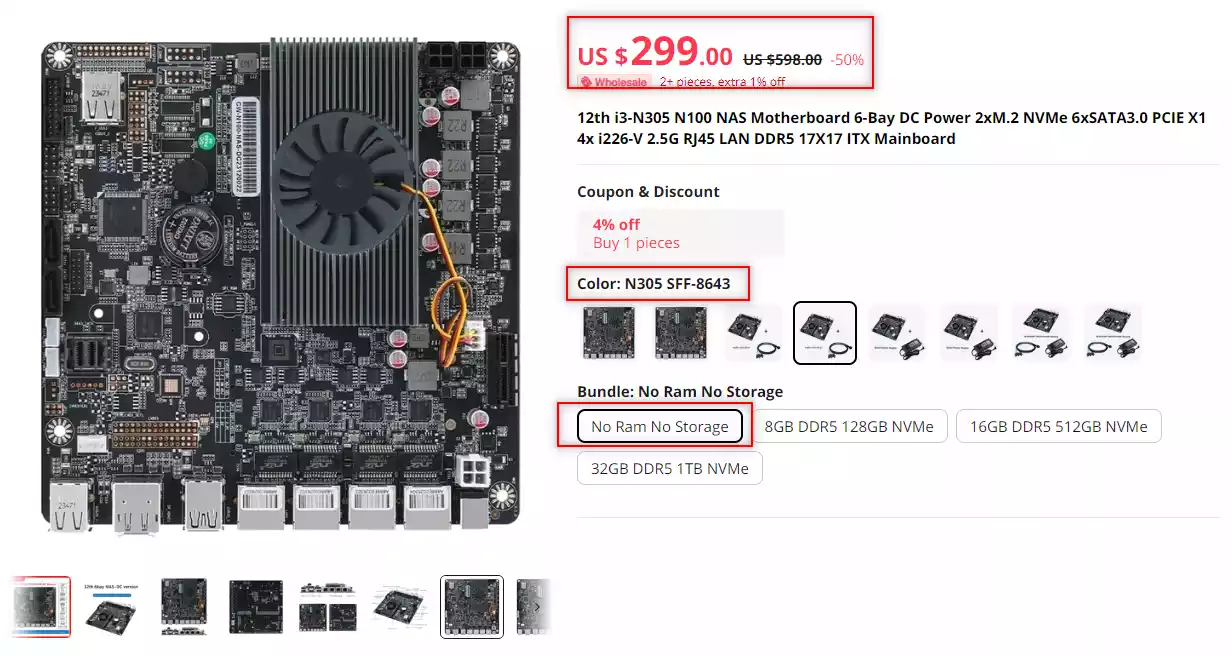
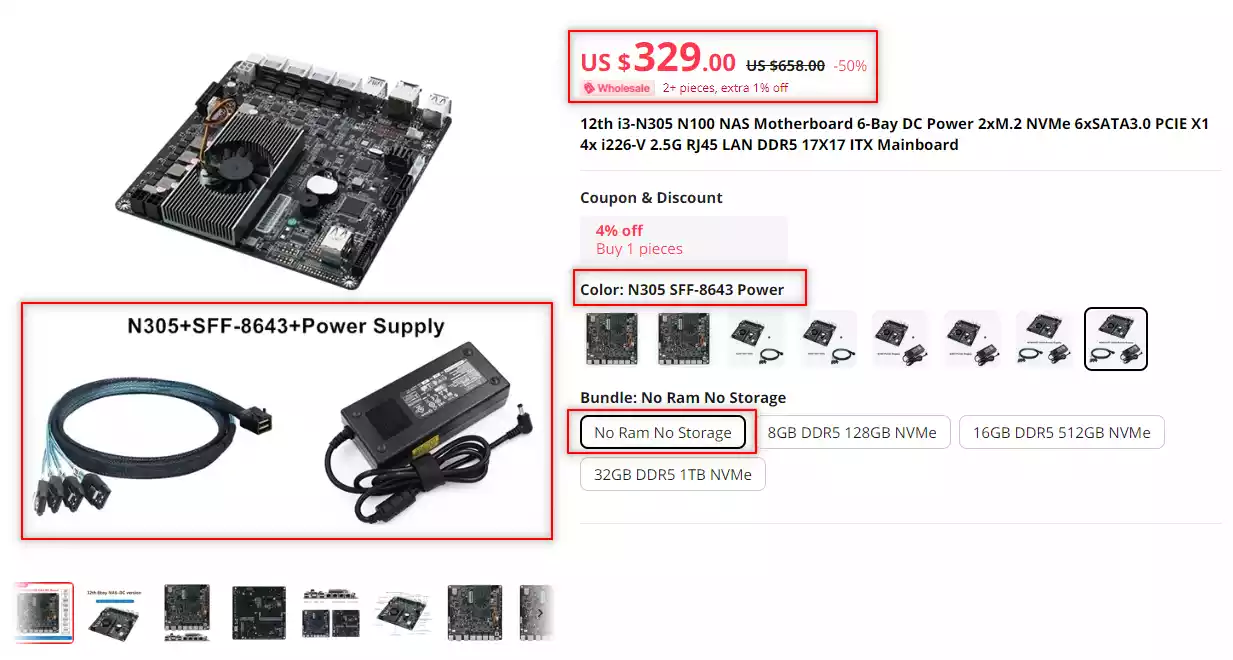
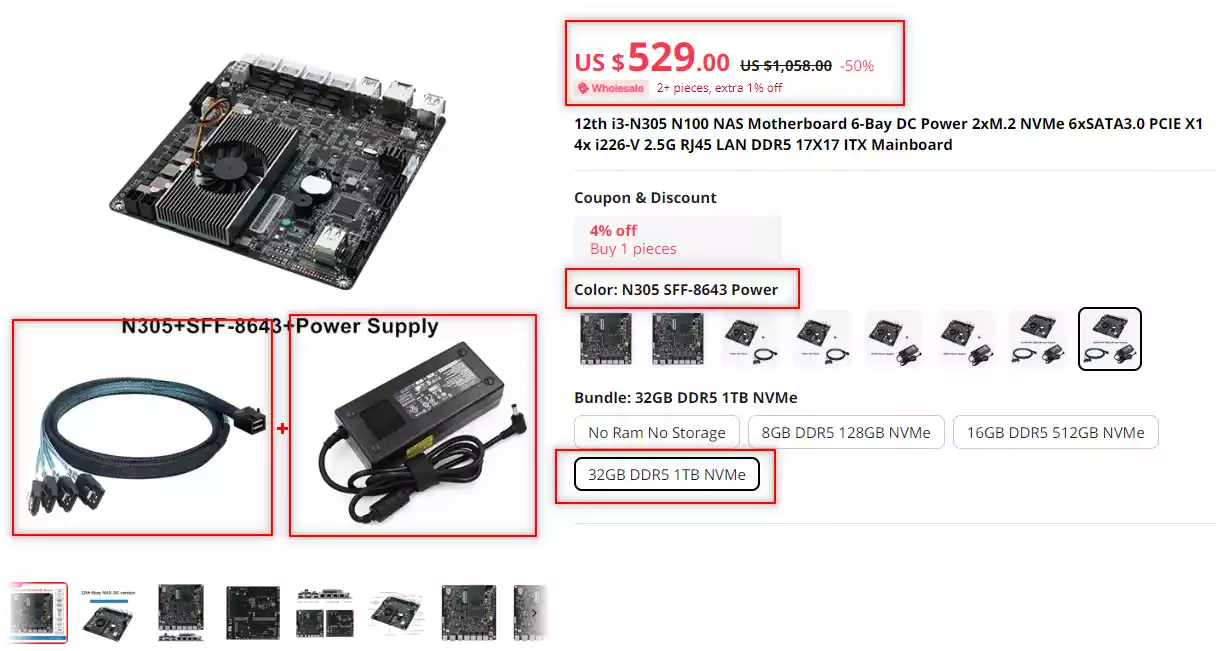



Great video. Wondering if you have done a video on ATX MBs? I’m using an old computer to build a NAS / Plex server. My existing MB is not win 11 complient and my CPU does not support integrated graphics. Thus I have to run a GPU board. The thing Idles at 90W with peak load power use of over 150W. Any recommendations?
REPLY ON YOUTUBE
Is there an ùpdate for 2025 or is it still the same?
REPLY ON YOUTUBE
nah just get a used supermicro x9 or x10 based superserver.. much cheaper than most of the combos shown, and way better quality. also you get way more fun enterprise features. not going supermicro is stupid.
REPLY ON YOUTUBE
First one needed to go SAS rather than SATA because the SATA ports were taking up too much room and not enabling a x16 slot, even if it only had 4x electrically being able to stick a 10Gb NIC in there were be a game changer, and yes you could use the 4x 2.5Gb with link aggregation to get 10Gb, but most 10Gb NICs come with 2 ports allowing you to do 20GbE then you link that up to a 10Gb switch that pretty useful. So no on that one.
Also N100 so no ECC, big no no.
REPLY ON YOUTUBE
Hear me out, but I actually think a great option is to get a used Intel Xeon e5 server bundle off of eBay. Right now, you can get a dual-CPU motherboard with two Intel Xeon e5 v4 2697 CPUs and 128 GB (4 × 32 GB) of RAM for $250. Between the two CPUs, you get 36 cores/72 threads (18c/36t per CPU) at a 2.3 Ghz base clock and 3.6 Ghz Max Turbo Frequency. The dual-LGA2011-3 motherboard has 8 DDR4 RAM dimms (4 single dimm channels of DDR4 RAM per CPU, maxing out at 32 GB per dimm/channel), 10 SATA 3.0 ports, 2 M.2 NVMe ports supporting 2230, 2260, or 2280 NVMe SSDs, 3 PCIe × 16 lane slots and 2 PCIe × 1 slots (I believe they’re probably PCIe 3.0, but it doesn’t specify) meaning you can add up to 6 more Gen 4 × 4 lane NVMe SSDs using the 3 PCIe 3.0 × 16 lane slot (PCIe 3.0 × 16 = PCIe 4.0 ×8, so 2 Gen 4 × 4 lane NVMe SSDs per ×16 slot) or you can use these PCIe slots for hardware accelerators, 5 USB 3.0 headers, 6 USB 2.0 headers, 2 Intel 2.5Gbps network interfaces, and 1 network slot is 5Gbps ethernet isn’t fast enough for you.
Even bought separately, the X99 dual LGA2011-3 mobo is ~$100 and the CPUs are ~$50 each. The RAM is likelt no more than $50-$100 for 4 × 32GB DDR4 modules. You would just need a 2U server chassis, a PSU, and whatever drives you’d like. For a NAS, you’d get great performance out of 4-10 enterprise/NAS HDDs running in RAID 10 and a couple of low storage but fast transfer rate M.2 NVMs SSDs to use for storage cache. All together, you’d be looking at $500-$700 for a super fast, data secure NAS with ~50TB of storage, and better yet, with 72 threads clocked at 3.6 Ghz, you could have this NAS double as a transcoding server, getting high bitrate, small size files pretty fast, without the need for hardware acceleration (Intel CPUs are also great at transcoding and even host their own form of hardware acceleration if you really wanted it, or you could throw a couple of Intel GPUs in here for cheap and get crazy good hardware accelerated transcoding capability (two Intel A380s would tear through some AV1 codec, and for maybe $300 for both GPUs).
REPLY ON YOUTUBE
I’m looking for high efficiency. My daily use case….I’m on the computer for long stretches….until I need something from storage. I am on my computer for long stretches…and my computer backs up my content.
Not trans 20 petabyte files, no. Not modeling every quark in the universe, no. Not trying to calculate opening a wormhole to another dimension, no.
2nd priority…I may need something that would render Blender frames if that’s possible. Also, I don’t need it super fast….if I were making money from Blender; then, I’ll buy real ITX boards with real cpu, ram, ssd.
REPLY ON YOUTUBE
I just built my NAS using a Dell OptiPlex SFF with Core i5 7500, 16gb of ram. 8TB storage. 256gb NVME. Use’s 20 watts at idle. Running TreNAS. It destroyed my Synology NAS in performance to price… wish I built my own sooner than buying off the shelf.
REPLY ON YOUTUBE
I have an AM4 motherboard that I’d like to reuse. I’m planning to use Unraid and wondering which CPU you would recommend. I was considering the 5600GT. I plan to connect six 14TB SATA HDDs. I care about power consumption, as the NAS will be idle 95% of the time. Any advice?
REPLY ON YOUTUBE
Hello! I know this might be overkill but i built another computer and these are the parts from it and figured id build a NAS since its just setting. Just need a decent case to fit a E-ATX MOBO!
What im concern about is once its all built what OS, or and software so i can login drom anywhere and have the same features as a Synology NAS Software. Please let me know your thoughts!
MY Parts List:
1. MOBO: MSI Prestige Creation X570
2. CPU: Ryzen 9 3950x
3. RAM: Corsair DDR4 2400-3600 Mhz
4. RAM: Samsung Pro (2X4G = 8G Total)
5. PSU GameMax 850W Gold
REPLY ON YOUTUBE
Multimedia needs a graphic card, trans-coding no slot.
REPLY ON YOUTUBE
I bought a Topton computer on Aliexpress and I was so angry with myself, it was a poor quality product, without technical support, it was money thrown away. If you want some advice from a friend, look for another brand.
REPLY ON YOUTUBE
I like Dell and HP ready made PCs as you have good quality components and things like tool-less access. I would be interested to see someone take out an old Xeon board and put something more modern and power efficient in place. You would almost certainly have to dump the original power supply. Or perhaps not?
REPLY ON YOUTUBE
Does youtube still delete comments if you mention that you shouldn’t trust your backups to some Chines no name OEM crap ?
REPLY ON YOUTUBE
Went seconhand with a used lenovo m83. It only has a 4th gen i5, 16gb ddr3 . I have a 500gb 2.5″ ssd and a 12t wd red nas drive. It runs next cloud well and truenas well. Whole system cost 250.00 us
REPLY ON YOUTUBE
helpful video! you sound and look just like alfie solomons
REPLY ON YOUTUBE
I bought a TOPTON computer on Aliexpress and I don’t recommend it, it’s a disposable and maintenance-free product. I don’t recommend it either.
REPLY ON YOUTUBE
PC Topton low quality product, no warranty and no technical support, I bought it on Aliexpress and it was money thrown away. Advice from a friend, look for another brand
REPLY ON YOUTUBE
A new Edition Form this Video ?
REPLY ON YOUTUBE
I bought a Topton computer and threw my money away, it is a low quality product, without technical support. Friendly advice, look for another brand.
REPLY ON YOUTUBE
I have an old Athlon x4 860K – should I just use that or is it worth investing in one of these if I am looking to build a NAS with 2x 4tb HDDs for image backup? I am a photographer.
REPLY ON YOUTUBE
Would you say it’s worth replacing the thermal paste at purchase?
REPLY ON YOUTUBE
Dont we require ECC support for devent NAS build?
REPLY ON YOUTUBE
is a 13400 a viable option?
REPLY ON YOUTUBE
No gaming benchmark no actual review ????
REPLY ON YOUTUBE
Anyone tried Erying motherboard with i7-13620H on board??
REPLY ON YOUTUBE
First thing you should do is throw out the power supply. Never trust generic Chinese power supplies, they’ll burn your house down…
REPLY ON YOUTUBE
Personally I wouldn’t touch the Frankenstein Chinese boards made out of parts pulled from old boards.
REPLY ON YOUTUBE
I thought that’s was gonna be actual CPUs and Mobos. Not these no name brands
REPLY ON YOUTUBE
x99? Not really power efficient.
REPLY ON YOUTUBE
Great channel! Found you through while researching about m.2 adapers for my usecase. Looking to build a nas with i5 7400 to have a jellyfin on it, it should be quite power efficient with right psu too
REPLY ON YOUTUBE
I’m looking to upgrade to those 12th-14th gen intel socketed ITX boards that have 3 nvme, 8 sata, and full x16 pcie slot. All native and full pcie. I’d likely run a i3-12100t as it still benchmarks higher than the n305. This seems to be the only way to not have any bandwidth limitations on connected devices.
REPLY ON YOUTUBE
I have the n100 board with 2 1tb nvme, a 128gb boot SSD, and 8 8tb ironwolf drives. The boot is plugged into the native sata port and 4 of the ironwolf drives are plugged into the onboard jmb585. The other four are attached to another jmb585 chip via pcie. I am running truenas and have each 4 drive grouping as a raid z1 vdev combined into 1 pool. As far as performance goes, everything works great and is fast enough for most things. I have had zero connectivity issues. The only minor complaint is that it idles at about 75w.
REPLY ON YOUTUBE
The SIM slot will just be a slot, there won’t be a radio, it will need to be added by M.2
REPLY ON YOUTUBE
is there any difference between the DC and AC version beside power input?
REPLY ON YOUTUBE
There have been numerous complaints about the N305 combo MD, – mostly unexplained crashes and instability.any comment ?
REPLY ON YOUTUBE
I just bought a beelink s12 with n100 and installed aan nvme 4tb and sata 4tb ssd run plex and jellyfin on it
REPLY ON YOUTUBE
Does intel 13th and 14th gen has problems?
REPLY ON YOUTUBE
Everything without ECC memory is useless as a NAS
REPLY ON YOUTUBE
Got my old B360 and i5 8400 for media and storage amd updated my lan. Never had any video glitch.
REPLY ON YOUTUBE
I am running an epyc 9124. One box that can do everything simultaneously. I don’t need fast networking because it is all local. Workstation, gaming PC, NAS, all in one box, simultaneously.
REPLY ON YOUTUBE
You should do this video on board from Tiawan, for those of us who do not want everything in our home to be from mainland. Which would also include not buying from AliExpress as a major method.
REPLY ON YOUTUBE
Hi guys! I would really like your help on building my first NAS. I just want my nas to do my own streaming service like Plex or other like it. And i would like to stream it in 4k. What do you recommend i get for this?
REPLY ON YOUTUBE
For real DIY nas You will need at last 2 PCIe elecrrically x8. One is for network card ( 25/40/100 GB/s ) and one for hard drive controller ( LSI / Hap/ Dell? ). More PCIe lanes with bifurcation should be recomended as well. Problem is that user grade motherboards got only 1 PCIe x16 and some X4 or more often X1 slots.
REPLY ON YOUTUBE
That X99 mobo is a little risky. Did some digging since I was interested in it. In April 2024 BKHD (manufacturer) released BIOS R014, which is shipped as a default with new purchases. It somewhat fixed ECC memory support (wasn’t working with earlier R009 revision of BIOS) but there were many configuration options cut from BIOS – people report that this includes, but is not limited to Intel VT-d and power configuration. I don’t know if Intel VT-d is enabled by default or not in the new BIOS, but for me this system was suppose to be NAS and a homelab machine for Proxmox. It is also not an mITX motherboard – it is larger and manufacturer states that it is a CeB format, so it won’t fit in cases that have no spare room over mITX tray.
Mobo with CPU (no drives etc.) idles at around 45-50W jumping to 140-150W with CPU fully stressed. MiniPCI-E slot shares its lanes with one of the NICs. At least with old R009 BIOS bifurcation worked perfectly and someone tested ASUS 4*m.2 card and all of the drives were seen in BIOS and were bootable, as the PCI-Ex16 slot was set to 4x4x4x4. VRM and chipset radiators run hot, where VRMs’ radiator was around 65-70C with downdraft cooler on the CPU. Chipset radiator was around 55C. So be sure to add some airflow if you plan a build with this mobo/CPU combo.
REPLY ON YOUTUBE
Great video! thank you!
any changes since the release?
REPLY ON YOUTUBE
How many ram are recommend, 2×8 GB oder 2×16 GB?
REPLY ON YOUTUBE
Hello. Which pc case is compatible with the first CPU combo?
REPLY ON YOUTUBE
Does the n305 i3 MB supports ECC RAM?
REPLY ON YOUTUBE
Hi everyone. I bought one of these and a jonsbo n3 and either im being incredibly dumb (which is likely) or is this board is really not that compatible with the case.
Ive built multiple PCs in the past and Ive been using a terrible WD home cloud for years (hell). Thought assembling a mini PC like this would be easy but so far the building experience has been quite frustrating. nothing seems to be compatible. I have a small list of things if anyone could help me out.
1. The board has no usb C plug so the USB C on the case is useless??
2. The board has no HD Audio plug, so the audio jack on the case is useless?
3. Most importantly the power on cable on from the front panel is in no way compatible with the pins on the board, with any of them, in any configuration. Am I supposed to cut the extra plastic on the thing and plug it in? also the cable only has 4 wires connected to the “plug” while there are 7 or 8 power pins on the boards part labeled F Panel. Im kinda lost here.
4. (Mea Culpa, didnt notice this) The board has 2 Sata ports on board + a SAS to 4 Sata ports. I expected to use the 2nd nvme slot to add the extra 2 missing sata ports I needed to fully populate the case but it seems that theres no way to do that beacuse the 2 nvmes are on the back leaving no room to place the sata connectors…
5. I had this doubt when watching the video and still do. The board has two 4 pin out to feed the HDD back plate but it also has one 4 pin 19V in connector. Do I need an entire PSU to connect a single 4pin in??? whats the point of having an external charger if im going to need the PSU all the same. So far I only have 4 HDD, do I have to have the 4 pin in connected right away or only when more hdds are added?
Aditonal comments:
-I bought the model with SSD an RAM included and it came without any of these. Im currently waiting for a response from the seller.
-My board actually came with 2 power cables to connect the MB to the board. I think in the video it was mentioned that these didnt come included but in my case they did.
Anyways. Thanks and great video!
REPLY ON YOUTUBE
I have the Amazon version of the M305 but my data get corrupted. Memory and drives are good. Bought two of these motherboards and got the same issue. Not sure what bios option to change to fix this. Any ideas?
REPLY ON YOUTUBE
How does it compare with a N100 board? The N305 are so much more expensive than the N100 boards I have found, so Wonder if it is really worth it?
REPLY ON YOUTUBE
i gotta say as ive started to move towards handling other peoples data professionally all of a sudden the two features i look for first are ecc memory and bios support. even if it means buying something older, it helps me sleep better.
that said, yea ok youre right to focus where you do in this shootout, you make good points
REPLY ON YOUTUBE
There is new one which look nice for all ssd diy alternative on ali. 6 Bay NAS Motherboard, i5-12450H 8505 Max, 6 x NVMe, 6 x SATA3.0, 1 x PCIEx4, Mini ITX, 4 x Intel i226-V, 2.5G, Firewall Router, 2 x DDR5 Motherboard
REPLY ON YOUTUBE
nice how you reviewd different solutions
REPLY ON YOUTUBE
Looking at the ERYING i9 13900HK, can anyone confirm if both NIC work in TrueNAS?
REPLY ON YOUTUBE
Video missed the wall power consumption information. Nothing mentioned about how much watts consumed for idle, or with full load. However, video title mentioned “king of power vs efficiency” lol…..
REPLY ON YOUTUBE
I’ve been favouring m-atx, something like the Erying i5-13420h, because with two slots, you can hopefully add a IT mode SAS card as well as a dual 10gb NIC, but then I’d go for a larger case with more bays
REPLY ON YOUTUBE
Why always 4 nics…. 1x1gbit (Management) and 1×2.5gbit(data) is enough
REPLY ON YOUTUBE
Will you try the new purple board from topton and other Chinese brands, I’m rly interested about the power draw and it’s 2 Ethernet port and I think pcie x4?
REPLY ON YOUTUBE
I wonder how they’re getting away with selling a 32GB RAM option when the N305 is officially listed as 16GB max.
REPLY ON YOUTUBE
Any really compact case that would be particularly be a good fit for this board and 6 2.5-inch drives?
REPLY ON YOUTUBE
Amazing video, I’ve watched it a few times now.
REPLY ON YOUTUBE
Can you please give an example what cabling would be needed to attach four SATA HDDs to this?
Are there adapters for the 4-Pin power output to SATA power inputs?
You will need individual SATA cables for each drive. If there is not enough connections you will need a card that adds extra SATA ports.
Love this. I just did a very very similar build and board selection process. Ultimately I went with a lower power board for just NAS use with a few Docker containers on an N100 build. It’s built out for good until I need a newer, bigger system, and I won’t look back at it to wonder if it could be better because I have no more lanes to support anything else hahahaha ???? so working within the itx form factor with these sorts of sff builds is an art form in itself. For me power consumption was the main thing along with total storage availability. 2.5g Ethernet was gravy because this isn’t a performant NAS, but a backup one. I plan on also building a near line storage NAS for video editing. I think people fall into the trap of making their hardware a jack of all trades but a master of nothing. Use the N100s for what they are good at, low power and non mission critical applications.
REPLY ON YOUTUBE
Been going down this rabbit hole for a bit. Some thoughts:
1) the i9 mb seems similar to the minisforum ms-01 solution. However minisforum includes 2 spf+ 10g and 2 2.5 g Ethernet ports, as well as 2 usb4. Plus, besides the 3 nvme slots, there is the option of adapting one of the nvme slots to u.2. This unit, especially with the cheaper i5 version is a complete nas flash storage with the option to add a decent gpu. Also, with the usb4/TB ports you can use the DAS solutions to really build up an array. I’m particularly looking at the Terramaster D5 Hybrid which is 2 hd/ssd sata drives plus 3 nvme slots. In the past I’ve built a 16 tb nvme das using the OWC 4ms and got about 1200-1800 MB/s transfers between the OWC and my Mac mini.
2) the Xeon mb option is reflected in the tons of e-waste towers from HP (z440 to z840) and Dell. These are interesting because of the 2 16x pcie slots, 1 8x pcie slots 1 4x slots. The slots are full length and full height. The many/cheap 4x nvme to pci cards which require bifurcation like HP does makes for an easy flash nas and the also cheap dual 10gb Ethernet pci cards makes for fast transfers. Again, these server/workstation towers often come with an nvidia card, such as a quadro. The only downside is the power requirements. Which is hilarious!
Thanks for the video!
REPLY ON YOUTUBE
So I bought this board from your review being generally positive about it. And I wanted to have some fun and build it my own. But, this with the power supply situation has me really stuck.
This board does not have that normal power 24 pin connector so I don’t really know how I would connect this to make 4 drives work.
You say “..you may need additional cabling here” what do you mean exactly?
Please give some additional information on how this board should be connected or used with more than 2 drives. I have the Jonsbo n4 case. And this backplane seem to have a molex connector. That is not possible with this external power supply? Or what additional cabling could solve this?
I just have this board laying around and I would be very grateful if anyone could give some info on this. Thanks!
REPLY ON YOUTUBE
After receiving back my Storaxa chargeback thought I would get myself one of these instead, and it seems the sellers are having a major issue as after nearly a month they refunded me as it seems they have some issues getting these out to people now, which is a real pity.
I’m doomed never to upgrade my nas at this rate
REPLY ON YOUTUBE
new Odroid H4 board dropped last week, choice of N97 or i3-N305 chip, 2.5GBe, PCIe Gen 3 X4, has a version with 4 SATA III ports
REPLY ON YOUTUBE
Is there any RAID functionality on board just for a resiliant boot devices?
REPLY ON YOUTUBE
Chicony.. never heard of them… WHAMZ you got a “dislike” from me 😛
Remember them well my Bondwell PC XT at 4.75Hmz had a keyboard from them in the 80’s… oh right you where not born yet sorry…. Pfftt…
(hmz kinda pressed the “like” by mistake sorry)
REPLY ON YOUTUBE
And here I sit trying to decide whether to build a NAS using a mini ITX mobo or get my Cisco UCS C240 M4 with 12 10TB SAS drives running. The Cisco is kind of big and noisy though and a bit of a power hog. It has two 1200W power supplies. Lol
REPLY ON YOUTUBE
should i buy an ATX power supply for this board or only use that external power brick that i can get with the board?
I would like to build in a power supply, but i have no clue on where to start. what is resonable to to buy?
REPLY ON YOUTUBE
I have the board and it is nice but do not buy it for the m2 slots. they are useless. With dd i get arround 200MB/s on one and the other is like 150MB/s
REPLY ON YOUTUBE
I’ve heard about motherboards having Spyware from brands like Asus, etc. What are the chances these have the same?
REPLY ON YOUTUBE
I’m new to this stuff, what kind of case would you guys use for say 4, 6 or even 10 drives? I like that inserted mobo with 2016 cpu, my drives aren’t that new but i’d love to rock 2.5gbit
REPLY ON YOUTUBE
Honestly I’m fed up with “nas” motherboards coming in with 8 or less sata connectors (even with mini SAS), while giving people 4 ethernet ports … WHY ? this supposed to be a NAS not a SWITCH. Even if you wanted to use it as a router, just two ports would be enough … but NO, we need to take 4 slow ports and pretend that this is not a bottleneck … idiotic.
REPLY ON YOUTUBE
Shoulda said in the title it’s Intel-only. Even then it pissed me off very highly.
REPLY ON YOUTUBE
Hey, do you have any more links to the X99 Xeon MoBo Combo? Seems that combo is MIA now.
REPLY ON YOUTUBE
EVERY COMPUTER runs dc power
REPLY ON YOUTUBE
People are getting excited for the wrong cpu. The one to get excited is actually Intel Pentium 8505: 20 lanes of pcie, dual channel memory. 4e+1p (so 6 threads total) cores. 1/3 cheaper msrp than n305. AV1 decode. Same TDP as n305: 15w. It’s absolutely no contest which is better for a nas and not only for a nas.
REPLY ON YOUTUBE
I have 11500 what mobo do you recomment? atm I’m using some really cheap Asus but it seams like its not really working out for nas/homeserver usage.
REPLY ON YOUTUBE
There’s also a variant of this board setup which uses an ATX power design and can mount a LGA115x compatible cooler, though you lose the 4g modem port and you get 6 SATA ports instead of 2+SAS. These ports are also in front of the PCIe x1 slot along with some headers, which will prevent you from plugging a x16 card in there. That PCIe slot is also shared with the second M.2 slot and you can only use one or the other, though this is true for all of those N100 and N305 mobos.
REPLY ON YOUTUBE
Do you know where can I buy a a 4x 3.5″ tray with integrated sata backplane to build my own case around?
Something not to expensive but functional.
Buying one of these retal nases to break it apart is expensive and kinda stupid 😀
REPLY ON YOUTUBE
One of the main things you would compare in a NAS motherboard would be how far the C states go. You just skipped over them in the BIOS…
REPLY ON YOUTUBE
holy crap i love you shirt. I dont trust RAID!!!!!!!!!!!!!!
REPLY ON YOUTUBE
Would be nice to get a video on matx board options too 🙂
REPLY ON YOUTUBE
Magic roundabout music was a nice touch. Most viewers probably wont know where that song is from.
REPLY ON YOUTUBE
Topton recently released a similar motherboard using an i7 1165G7 (or similar i5 and i3), do you think you can also review one of these?
One of the advantage compared to this N305 motherboard, is that the 1165G7 has more PCIe lanes, thus 4 lanes to each nvme and 4 lanes to the PCIe connector as well. And the Xe graphics are way better too for transcoding for instance…
REPLY ON YOUTUBE
You are the God of NAS out there. Thank you for your content.
I appreciate your work so much!
REPLY ON YOUTUBE
What is the idle power consumption of the board itself with the nvmes alone? I can’t imagine it being lower than 19-25 watts due to the many controllers that are used to split the pcie lanes and NICs…
REPLY ON YOUTUBE
But how do you power the HDDs? If you still need a PSU it defeats the purpose of having DC input. Also you’d need some way of jump starting the PSU as you don’t have the ATX 24 pin header. I see that it has 2 4 pin ATX outputs but it doesn’t come with the cable and the pin out is non standard.
REPLY ON YOUTUBE
You never heard of Chicony? ????
REPLY ON YOUTUBE
Wow. I have just subscribed. What a gem of a channel.
REPLY ON YOUTUBE
Have you seen the 12xSata Port Version of the N5095 NAS Board?
REPLY ON YOUTUBE
Have you never heard of the immortal keyboards from Chicony? LOL))
REPLY ON YOUTUBE
Where are the details about power consumption? Why is this missing for a 24/7 NAS Mainboard?
REPLY ON YOUTUBE
is shield back panel thin mini itx size? or standard mini itx size shield back panel … can find any info about this aspect
REPLY ON YOUTUBE
Another interesting summary.
Have you verified the sata throughout on the N305 board, or Indeed the N100 version? Someone recently did some heavy testing on the BKHD green N100 version and oddly the sata controller was tied in at pcie2x1 speeds. Which is a bit mad since the cpu is pci3x9. Any thoughts?
REPLY ON YOUTUBE
I wonder if anyone’s tried building a NAS from a used Framework mainboard. Might be worth considering for a future video.
REPLY ON YOUTUBE
Roland Rat says hi.
REPLY ON YOUTUBE
for a firewall which one would you chose among all the ones you have shown us?
REPLY ON YOUTUBE
I love the Atom/Alderlake N family of processors. Imagine we get a similar board with a real i3 and you had 20 PCIe lanes to work with and could use 64-512GB. The downside is that the real i3 has 4 of the E cores cut in favor of having 2 P cores so power usage goes up without much performance increase so it would need beefier VRM and cooling, without much perfromance increase, and in some cases might be slower, but i’d trade that for say 8M.2 at 2x link speed and SFP+28
REPLY ON YOUTUBE
Has anyone purchased the X99 Mobo with the six ethernet ports? And if so how well does it work as a NAS setup?
REPLY ON YOUTUBE
You don’t need shit like that to have an efficient NAS, just a good DIY solution with an Intel cpu, possibly 8th gen.
REPLY ON YOUTUBE
I want an N300 fanless option. 10% less CPU performance for half the power consumption (7w vs 15w)
REPLY ON YOUTUBE
Most of my floppy disk drives were either Teac or Chicony back then.
REPLY ON YOUTUBE
I really don’t like (or fully understand) the two 4-pin aux power connectors, in addition to the main DC-in barrel jack. Are the aux connectors (one or both) required for PCIe add-in cards? They aren’t used for a SATA/SAS backplane with spinning rust drives – that has to get power directly from the PSU. So to build a NAS with this board, you’ll need a (likely flex) ATX power supply AND the external power brick. That seems kind of silly.
REPLY ON YOUTUBE
I bought the TerraMaster F4-424 Pro after watching your videos. I know you said it’s sad it didn’t have 10 gig, but I guess that NAS is for people like me … I don’t have even have 2,5 Gig to my router so I am doing dual link 1 gig till that day I upgrade my router… It’s my first NAS with Plex and some programs running in Docker on it. Can recommend the NAS and this N305!!
REPLY ON YOUTUBE
0:11: ???? High-performance Topton N305 NAS motherboard with customizable upgrades for power and efficiency.
3:40: ???? Topton N305 motherboard stands out for its unique features and versatility in terms of power and efficiency.
7:29: ???? Insufficient resources for high-speed storage on Topton N305 NAS Motherboard.
11:53: ⚙️ In-depth BIOS configuration options offer extensive system tweaking capabilities.
14:37: ???? Exploring hardware specifications and limitations of Topton N305 NAS motherboard.
17:39: ???? Performance test results of Topton N305 NAS motherboard with added SSDs for entry-level users.
21:01: ???? Comparison of performance, power consumption, and noise levels of different motherboards.
Timestamps by Tammy AI
REPLY ON YOUTUBE
€200!
REPLY ON YOUTUBE
Why do they all continue to put in 4 ethernet connections? It’s already starved for bandwidth, and it increases build cost. I’ve yet to see one using those connections where it makes sense, even as a router there are other options that are smaller and better.
REPLY ON YOUTUBE
I had to push PayPal for a chargeback to get topton to give me service. So keep that in consideration when buying something like this.
REPLY ON YOUTUBE
Hi can you test the next orange 8tb m.2
REPLY ON YOUTUBE
No ECC, no thanks ????
REPLY ON YOUTUBE
@NASCompares for sim card to work you need to put modem in the mini pci slot,
REPLY ON YOUTUBE
Great video. My trusty N6005 board is good enough, but nice to see these newer boards.
REPLY ON YOUTUBE
aliexpress anniversary sale starts on the 18th of march just fyi
REPLY ON YOUTUBE
Hm, you mention „low power consumption“ several times, but didn‘t test it? The problem with this board is, it doesn’t really get to low C–states due to that rubbish SATA controller. Mine idles at ~17W, without any SATA drive connected.
REPLY ON YOUTUBE
Don’t know about the current Chicony but ten years back they were making a lot of notebook computers sold under a number of names including their own. Brands used to give them some specs and logos and they would produce custom versions of their designs using the specified design and with the brands logos and names. They were not the best, but far from the worst notebook manufacturers.
REPLY ON YOUTUBE
This would be a perfect board for a camping van. Low power, acceptable connectivity but integrated LTE
REPLY ON YOUTUBE
nice video and board.
Since my contry decided to ban aliexprexx, alibaba and most things china, may i offer to buy this board off you if your not using it ?
REPLY ON YOUTUBE
Never understood all these 1G or 2G Nics onboard. Prefer having 1 10G nic and call it a day and have more room on the board for other components
REPLY ON YOUTUBE
What cpu cooler can you upgrade with?
REPLY ON YOUTUBE
Another contender is the minisforum ms01. It offers much more right up to i9 gen 13 intel (pci slot sets up the possibly to config the storage you want).
One thing that is in common is the barrel jack power supply. It would be great to find a converter to go from the barrel input to a standard pc/NAS power supplies to power all the disk drives
REPLY ON YOUTUBE
How much ECC really matters, if you make NAS to boot like daily?
REPLY ON YOUTUBE
just info Aoostar R7 nvme 512GB gen3x4
root@pve:~# dd if=/dev/nvme0n1 of=/dev/nvme1n1 bs=1M count=1024
1024+0 records in
1024+0 records out
1073741824 bytes (1.1 GB, 1.0 GiB) copied, 0.377167 s, 2.8 GB/s
REPLY ON YOUTUBE
No ecc, non-atx psu, no 10gig network… Nah, pass
REPLY ON YOUTUBE
i know there is a dual 4 pin power output on the board but is it enough for 6 or more hdd ??
REPLY ON YOUTUBE
Would be wonderful if you can export the IOMMU groups and confirm thtat we can passtrough the iGPU. Great video!
REPLY ON YOUTUBE
You probably need a mini pci-e modem card to use the sim, since in lot of cases the sim slot isn’t on the card itself.
REPLY ON YOUTUBE
They really need to just put 10 gig on the board, rather than 4x 2.5 gbe connections. The 1x PCIe is only gonna give you about 7 GBe throughput if you slot a 10 gbe card in.
REPLY ON YOUTUBE
Nice review! that puppy goes all the way up to 48 GB of DDR5 ram btw, that’s what I have in mine!
REPLY ON YOUTUBE
idk this thing tries to be everything and makes such weird compromises that it doesn’t shine in any particular usecase
REPLY ON YOUTUBE
I think this is why your guest from Ugreen yesterday was talking about a 12th gen i5 in their upcoming NAS. A bog standard i5-12600 supports 20 lanes of PCIe3 and PCIe4, and thunderbolt. But being Intel, still no ECC! They want you to buy a $2000 xeon to get that…
REPLY ON YOUTUBE
few months ago I built my NAS based on Topton 6005. The performance shows me that CPU is never going above 40% while averge is around 5%. That board accepted 64GB RAM that is a key point when you use ZFS. So question is: how is this i3 better than 6005 in such usage? Probably it is not. Of course if I was buying today I would have bought this one. But still: can we be always on the top?
REPLY ON YOUTUBE
hey Robbie, the PCIe debacle with all of these (previously known as) Celeron chips is an Intel marketing thing. There’s no reason they could not have put 20 PCIe lanes on these chips except they really want to sell you a 12900. You really have to question whether you’d be better off with the Erying 11900 laptop cpu board for anyone who cares about i/o performance.
REPLY ON YOUTUBE
Chicony was the name of my first computer keyboard i386 – 1994
REPLY ON YOUTUBE
so it doesnt have a 24pin header for power? i am looking for a low power board that has that header
REPLY ON YOUTUBE
It’s unclear to me how to power SATA devices when using this board. There are two connectors marked “12V output” next to the CPU heatsink, but SATA devices need 12V, 5V and 3.3V. You say powering SATA devices needs “additional cabling”, but does they also need an additional power supply? A lot of great information here otherwise, thank you!
REPLY ON YOUTUBE
How would one connect 8 HDD’s on this board?
REPLY ON YOUTUBE
Great review! I’m really loving these NAS boards. However, I wonder if it’s possible to mount our own cooler of choice? At the very least it would be nice with a nicer fan.
REPLY ON YOUTUBE
The The X99 Motherboard + XEON + RAM Kit is not an ITX standard size, is is a little bigger. You can non fit this board in a Jonsbo N3 case.
REPLY ON YOUTUBE
Supermicro x11ssm-f is micro ATX, has 8 Sata, 2 pcie 3.0×8 and 2 pcie 3.0×4. It’s like $140 on eBay.
REPLY ON YOUTUBE
If you’re willing to look at MicroATX boards, and I would due to the availability of the relatively inexpensive Fractal Node 804 case (mATX, 10 3.5″ bays), you open up a world of possibilities. For instance the ASRock B550M Steel Legend, with 2.5GBe, 6xSATA, and 2xfull length M.2 slots (and 1x short M.2 slot for a Wi-Fi card). If all you want is mirrored flash storage, get 2 M.2 drives, and one 2.5″ SATA to boot from, and get a small/cheap case like the Fractal Core 1000 (#notspon).
REPLY ON YOUTUBE
gotta say I love your channel, and your voice
REPLY ON YOUTUBE
From AliExpress? Why not use hardware that doesn’t support the CCP? Sorry, I don’t buy anything that isn’t Tawain.
REPLY ON YOUTUBE
Sorry, I went through but I didn’t see one with 6+ SATA, 10GigE in a single port, and a pair of NVME sockets. Is that an unrealistic spec to be looking for? I don’t mind which form factor the motherboard has.
REPLY ON YOUTUBE
I have a Rosewill RSV-L4500U NAS chassis.
It’s a proper case with room to grow with 15 drive bays. I don’t understand why you pretend here that there’s nothing out there that will take a bunch of drives and still support ATX boards. It’s not like the chassis is incredibly expensive either.
REPLY ON YOUTUBE
Not spending $300+ without 10GbE. What’s next? A 20 port 2.5GbE board? Do these manufacturers not understand that there is MORE than just 2.5?
Nonetheless, thanks for the video!
REPLY ON YOUTUBE
n305 are not available on Ali 🙁
REPLY ON YOUTUBE
Garbage grade Ali express shite. Level up your channel.
REPLY ON YOUTUBE
The nas is going in the closet. The case just needed to hold hard drives. So shape of the case doesn’t matter too much. Look for lots of hard drive bays.
REPLY ON YOUTUBE
Totally not related but I’d be curious on how that N305 board would fare as a TV box?
I’m still looking for the perfect replacement for my nvidia shield, but it’s just too damn good compared to the alternatives, yet it’s so old and lacking development
REPLY ON YOUTUBE
Could someone please let me know if there’s some manual available for the i3-N305 board? In particular, I’d like to know the specifications of the CPU fan (type (fixed or variable RPM), size, voltage). Thank you.
REPLY ON YOUTUBE
I went with a G ryzen and a b550m VC from msi-only new part- board has 2xnvme pcie3x4-this cuz the G ryzen-, 8 EIGHT sata ports by the way sata and nvme can all work at same time, a couple pcie slots for any future whatevers. Now for my use case, 1G lan is more than enough, Id say but still have them pcie slots justin! 6x hdds now and an os ssd, no cache drive, dont think ill need it, at least not now, and i read that most ssds will have not a good time being cache, since their lifetime is on the amount written. Wanted to get one of them X99 setups though, but this was quicker and less power, all on an old PC case with hdd mounting spaces with a couple extra fans thrown in there
REPLY ON YOUTUBE
What about this new board from CWWK? (can’t seem to add the link)
It is AMD based with no intel transcoding support but it has alot more power (dedicated GPU)compared to the N305, more storage connectivity upto 9 sata ports, ECC memory support with the 7940HS CPU and even an pcie slot for future 10gb upgrade. Will this board be the endgame for DIY builders or am I missing something?
REPLY ON YOUTUBE
If you haven’t a problem with second hand things. I have picked up an i5 8500t with an Asus z390 ATX mobo with Asus hyper M.2 card, 64GB ddr 4 2666, ATX Gold powersupply all in an old case with lots of 3.5 and 2.5 inch bays. Still have a lot of PCIE and Sata ports free for the future. Power draw <40W. All for around €200, storage not included
REPLY ON YOUTUBE
What OS are we going to run on this?
REPLY ON YOUTUBE
AliExpress for European buyers is awful. Months for delivery and often non-functioning then weeks of return delay.
REPLY ON YOUTUBE
For Just a NAS I would get a motherboard with an intel N100 intergrated and add SATA ports over m.1/PCI-e or just a regular NAS
REPLY ON YOUTUBE
While I see the appeal of MOBO+CPU options, I think the lack of serviceability makes them simply not worth it. I recently bought a 4650G because of the ECC support and okay CPU performance (and because it was dirt cheap, $110). Just slot it into any AM4 Gigabyte/ASUS board and UDIMM ECC is fully supported for a total of $200 MOBO+CPU. Still thinking about if I should do an ITX build with Jonsbo N1 or an ATX building with a Define R7.
REPLY ON YOUTUBE
Another great video! Thanks!
Is it possible to build an efficient PC on one of these motherboards in which the raid array will be managed like a NAS and will have most of its functions? I don’t have typical network needs because I work alone on video editing, but I care about data security. I was thinking about a PC with two NVMe drives and a 4-6 HDD array.
REPLY ON YOUTUBE
The n305 board sharing the pcie late between the m.2 and the 3.0×1 slot was the reason the went with the n100 green board. Those lanes are not shared. Of course, after I ordered it, About a month ago Topton released a new version of the n305 board that does not share this lane.
REPLY ON YOUTUBE
i highly recommend a used Server with a Xeon 26xx, 26xxv2, or 26xxv3. Can pick them up with CPU + Ram for 80 to 150 bucks, and some come with 10G Lan and more SAS/SATA then one needs.
REPLY ON YOUTUBE
i had a fealing, that no one car in nas community about synology anymore. does you feel the same?
REPLY ON YOUTUBE
Why? Do British! Techtubers talk like? This. Now?
REPLY ON YOUTUBE
The N-series of Intel chips, especially not of the 8-core variant, are pretty weak, so if you plan to use them with dockerised apps, not so good… Intel’s i* H-series and now Ultras are the way to go for efficiency and because they have iGPUs with well supported hardware accelerated transcoding for the media serving use-cases – some apps/platforms may require extra cost for supporting Nvidia or AMD encoders – they make good basis for such builds. Newer gen may also be seated in TB3/TB4 enabled board, so device extension is quite possible…
However, one could venture experiments with Epyc Siena. Why? Most boards for Siena come with 2 or 4 NICs, 2 of which often are RJ45 ports, with the other 2 for SFP28, so up to 52Gbps trunked output… enough to feed a quadruple of 10Gbps clients. Of course, those optical ports need connecting to a good switch. MikroTik has one with 16 SFP28 ports, if I recall correctly. SFP28 ports and transceivers can work at 10Gbps speed, basically being supported in SFP+ cages… Then, those Siena boards can be paired with Siena chips… starting from an 8 core 16 thread units you can scale now or in the future, depending on workloads, up to 64 core 128 thread design of Zen 4c chips, granted running at the efficiency oriented part of the bell curve. Add to that DDR5 RDIMMs support and 6 to 8 slots of those, and you can start small, then bump your platform as needed or as promos happen… Same for the storage and extensions… MCIO or slimSAS ports on boards are great for cable routing, after all most boards support splitting of signals into 4x or 8x SATA or SAS devices. Still, with a couple of MCIOs, you can easily use one or two split to cover spinning rust devices and still have some for bifurcation for NVMe U.2 drives to get better speed out of the NAS. Why is that a great thing? If you ever wanted to do a SATA SSD NAS, you’d be looking into 4TB+ models. Currently, at those capacities, SATA devices cost roughly the same as many cheaper enterprise PCIe3 or PCIe4, often around $20 of difference… for max throughput and iops nearly 5 times higher than the average SATA units… Once those U.2/U.3 drives drop in prices for high capacities, they may become defacto first choice even for homelab and NAS uses. Then, having a board that can easily already support those devices would be great and far easier to sell the idea to your spouses, so the wife-approval factor may be a benefit here as well.
So building NAS on your own you need to differentiate between those with minimal usage scenarios needing something as efficient as possible and those willing to have a platform they can expand in the future per the needs or promos…
REPLY ON YOUTUBE
While Synology seems to be taking forever to upgrade to gen 12 processors, I am more and more looking with interest the Supermicro SuperWorkstation 531A-IL for a solid unRAiD build. What do you think?
REPLY ON YOUTUBE
Ali Express?, goodbye.
REPLY ON YOUTUBE
I just finished up my nas upgrade with an Minisforum BD770i. The AMD Ryzen 7 7745HX (8c/16t) is a beast. In Unraid system idle it uses only 23w since it’s a mobile chip. I used an m.2 nvme to 6x sata adapter and it works like a charm. Since Plex natively supports amd igpu’s this mobo is a champ at transcoding. I highly recommend this motherboard.
REPLY ON YOUTUBE
Greetings and thank you for the video! I enjoy your channel.
Looking forward to your video on NAS with ECC memory. I bought a *used* Lenovo P520 that included 128gb ecc memory and a 2135 XEON for $300 US. The internals are fantastic. The power – ouch – it has a 900 Watt power supply. I bought 6 *used* 10TB HDD and 2 1TB NVMe drives. I’ve installed TrueNAS Scale just to play around with it (I’m an old pro on building PCs but a newbie on building NAS and VMs). Wish me luck…and any feedback would be greatly appreciated!
REPLY ON YOUTUBE
If you are going for a N305 in 2024, then I suggest you get a 8505 instead, a bit more money and Watt, much more powerful and 20 PCIE lanes.
REPLY ON YOUTUBE
Hey, I have been really struggling to find a NAS to upgrade to. I want to run mostly 4k HDR HEVC content. I play it mostly on my LG G1. And I don’t understand HEVC thing, some of that content doesn’t run when I play it on the TV off my Plex Server ( currently using a Synology 216+). I have watched quite a few videos but I still can’t make an educated purchase.
Can point me to a product? I really want good performance in a small box. A small pc sounds like a good choice but I kind of prefer a NAS, somethign that runs at home 24/7.
REPLY ON YOUTUBE
N100-N305 MB+CPU are crap. If you Seriously need more and faster PCIE lanes, or if you need more than 16 GB ADRESSABLE, not just recognized RAM. (By the way only single chanel) this combo is not the best.
I Strongly recommand the combo MB + CPU from CWWK => AMD-7840HS/8845HS/7940HS – 9 SATA/8-BAY/9-BAY NAS – USB4 – 4 NETWORK 2.5G – PCIE X16 ITX MOTHERBOARD:
I dont put links, i don’t why, but my comments won’t show up. Soo i try without link.
REPLY ON YOUTUBE
Gosh I’ve been looking for weeks now for that N305. It’s a purple unicorn!
REPLY ON YOUTUBE
why is everyone so obsessed about ITX mobos?
they lack PCIe and SATA connectivity, RAM expansion, space for bigger (silent) cpu cooler,
if I weren’t using my X99-S desktop workstation as main PC, I’d simply make it a NAS build, since also the case (Fractal Define R5) supports 8 HDD bays already…
REPLY ON YOUTUBE
Just yesterday I finished building & setting up my first NAS. Went with Gigabyte B550i Aorus Pro paired with Ryzen 7 PRO 4750G, 2x 32 gb ECC, 4x Exos 18X and SN850X, built in Node 304. I think it’s quite well balanced home NAS for 2.5 Gbit network.
REPLY ON YOUTUBE
Kraftwerk…thank you
REPLY ON YOUTUBE
Power consumpion on Erying? ????
REPLY ON YOUTUBE
Anyone up for a challenge?
Mini-ITX, Intel, >=11th Gen Intel CPU with 2x Media Engines, IPMI, IOMMU, 5x SATA, 1x NVMe, 1x PCIe x16, 1x >= GigLAN, 1x Monitor-Port, >=2x USB, (ECC support)
Any experience with these NVMe to SATA adapters?
REPLY ON YOUTUBE
@5:44 Ok, that sound is trippy
REPLY ON YOUTUBE
N305 IS NOT AVAILABLE!!!
REPLY ON YOUTUBE
Since ECC is one of the most important things in a NAS if you value data integrity (which most NAS builders do), maybe you could bring out more prominently which ones support ECC and which ones don’t?
And for a list of “best NAS CPU+mobos for NAS” there’s very little ECC support among the suggested alternatives.
REPLY ON YOUTUBE
the mobo you’ve shown with xeon – biggest question is whenever it requires gpu to boot up …
REPLY ON YOUTUBE
I’ve been hesitating clicking the buy now on that e612 Xeon board with the 2.5g ports
REPLY ON YOUTUBE
I think as soon as you review an item the aliexpress stores use this as an opportunity to start increasing prices. Sometimes they just up their shipping costs to give the illusion of a cheaper product. ???? Or am I just being cynical.
REPLY ON YOUTUBE
I would say that a SuperMicro X14QEH+ mainboard with 4 Intel Xeon Scalable 5th gen Platinum 8593Q processors. This way you have 17 MCIO PCIe 5.0 x8 connectors and room for 24 NVMe PCIe 5.0 SSD’s at full speed. +2 NVMe PCI 3.0 x4 ports for slower speeds. That Mobo will certainly fully saturate 400GBps networks. It’s a cheap ass solution for if you want to replace a NetApp MetroCluster. Especially when compared to the best NAS/SAN solution in the world, the FAS9500.
I don’t get why you would call consumer goods, the best motherboard CPU/Combo’s while there are so much better Enterprise solutions.
with your solutions it is even hard to saturate a normal 10/40 GBps connection. As soon as more then 40 users connect to your storage solutions, you will run into bottlenecks.
REPLY ON YOUTUBE
The problem is these boards are not built to last. I have an alderlake n305 mini itx diy router like these and it just stopped working. It never reached temps above 80 degrees Fahrenheit and ram and name test fine outside of motherboard. Dealing with topton customer service has been an ordeal the past two months trying to RMA.
REPLY ON YOUTUBE
They say on Reddit that the sata controller on that n305 board from JMicron is bad, particularly doesn’t allow CPU to reach some higher C-states
REPLY ON YOUTUBE
I have an idea for building a Gen 4 TrueNAS.
Biostar b550m MX/E, already indicates it supports bifurcation and its good price where im at. Bifurcation cause i plan to use a 4x nvme adapter.
My old Ryzen 3600. Relatively power efficient, at first i had the idea for an Epyc build, but that idles close to 100W.
ECC unbuffered memory can also be used here.
Also have a RX6400 when i need to use a gpu, as this will be a TrueNAS machine i probably wont need a gpu much.
I will probably buy two 40gbe mellinox connect x3 and some DAS cables.
Would need to think of something for an efficient small psu, i like sfx ones, but most of them have bad efficency at low wattage.
REPLY ON YOUTUBE
Is there any sense in getting the 13900H? Will all that power be utilized? Why not just go and buy the 12800H, even though there is a performance drop of 25,000 passmark vs. 29,400 passmark. The number of PCI-E lanes is the same – 28. Also, DDR4 is cheaper than DDR5.
REPLY ON YOUTUBE
That XEON board is very interesting. The rest seems overpriced.So unless you actually need ITX for your build.
REPLY ON YOUTUBE
ECC please with this cheaper CPUs…
REPLY ON YOUTUBE
First!
REPLY ON YOUTUBE
I stay away from n series (n100,n305) chips. They don’t support hyperthreading (all “E” cores), don’t have good single core performance, and only provide 9 lanes of pcie gen 3. Makes it very difficult to build a NAS with SATA, NVME, and 10 gig networking without something getting starved for pcie lanes
REPLY ON YOUTUBE
I bought the Aoostar R7 on the back of your review so would be interested to see what you do with it. So far mine is running Unraid and I am seeing some interesting behaviour. Works, mostly 🙂
REPLY ON YOUTUBE
Sadly the N-305 MoBo is sold out everywhere on Aliexpress. Tried buying one last week and the order got cancelled yesterday. ????
REPLY ON YOUTUBE
Can’t recommend Terra master made by the chinese
REPLY ON YOUTUBE
If you are looking to sell your old Erying i would buy it off you 🙂
REPLY ON YOUTUBE
Minisforum AR900i would be a perfect candidate here
REPLY ON YOUTUBE